#like in Khvarena of Good and Evil—
Text

Not leak related, but I'm crossing my fingers that one day we find out who is the one who struck Elynas down. It seems that he caused quite the ruckus and many people passed while chasing him to put him down and there is a certain artifact set that touches on whoever took him down and their possible connection to Khaenri'ah and losing faith in something.
#◟༺✦༻◞ what lays behind the mantle of faux stars ┊ooc.┊#the timeline of that is pretty messed up too#if this is about Elynas#unless it's an allegory#to the real thing#but aspects of it have to be based#on what happened for real#whoever struck him down must've been quite resistant#to the abyssal influence#and quite strong too to put down a beast#of those dimensions#I'm also silently praying#that besides his own AQ#that Dain has another cameo in a juicy questline#like in Khvarena of Good and Evil—#I'll never let that quest go
3 notes
·
View notes
Text
[3.8] Technology as a False God: On "Evolution," the Duality of Machines, Replication, and Wisdom
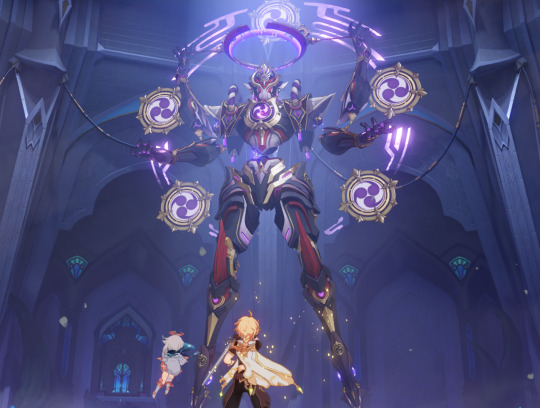
“To recognize untruth as a condition of life: that is certainly to impugn the traditional ideas of value in a dangerous manner, and a philosophy which ventures to do so, has thereby alone placed itself beyond good and evil.” –Friedrich Nietzsche, Beyond Good and Evil
Before we move on to the nation of justice, I want to do one last inquiry into the narrative significance of machines and technology in Genshin’s 3.x patch cycle. Here, I’ll discuss how divinity (or “godhood”) and technology are treated as interchangeable tools to surpass fate and the boundaries of mortality, the potential problems with treating them this way, and propose an alternative relationship between humanity and technology as illustrated through Karkata, Benben, Tamimi, and Mehrak. By foregrounding machines, we learn something intriguing about ourselves and the “truth” of this world as we perceive it.
SPOILERS: All Sumeru Archon Quests, Caribert, the Golden Slumber and one out-of-context screenshot from Dual Evidence, the Dirge of Bilqis and its post-quests, Khvarena of Good and Evil, Nahida’s second Story Quest, Faruzan’s hangout, an out-of-context screenshot from Baizhu’s Story Quest, and major spoilers for Persona 5 strikers at the end. Also some dialogue from Shadows Amidst Snowstorms and A Parade of Providence, two limited-time events from 2.3 and 3.6 respectively.
Disclaimer: I have tried my best to write this post so that it stands on its own, but because it is still a sequel it will probably make the most sense with the context of part 1. Here are the previous posts leading up to this one:
Part 0: On Dreams, the Abyss, Forbidden Knowledge, and Wish Fulfillment
Part 1: The Uncanny, Fate and the Machine
Terminology:
Machine is sometimes used interchangeably with “technology” in this post.
Technology or tool here is referring to technologies specifically used to pursue a wish like immortality in the face of existential dread, not the use of technology or medicine (which I do not address here, and is very difficult to separate from the former) to facilitate someone’s life who could otherwise not survive without that technology, or would have a more painful lived experience without it.
Also, though I don’t engage directly with “A Cyborg Manifesto” here, Donna Haraway’s ideas have greatly influenced my own over the years since I read her in college (although I mostly disagree with her on many points, or at least don’t go as far in boundary deconstruction as she does). I owe my interest in technology studies to her and that piece. Her essay is linked here and at the bottom if you would like to read it.
(and finally with many, many, many thanks to my boyfriend for multiple beta reads despite not having played a single Hoyoverse game, helping me work out the philosophy bits and contextualizing them in history, and encouraging me to finish this)
TL;DR: Machines are friends, not food!
No Matter the Cost
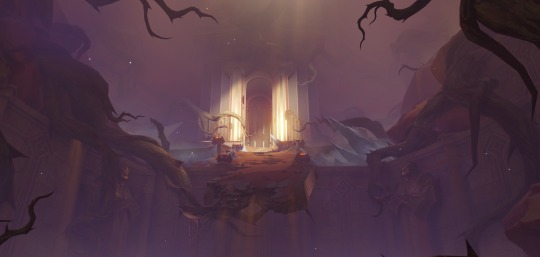
“...Perhaps it is as the notebook says, and we can find a power that transcends even that of the Abyss — the power of ‘evolution’...” -Records of Unknown Attribution (I)
“Life, death... and the world around us all follow a set of laws... Hehe, but if you never test the limits, how can anyone know where the boundaries of these laws are?” -Baizhu Voicelines, Chat: Natural Laws
“...Even the ominous thing that came down from the heavens shall be ours to use…” -Hyglacg, Shadowy Husk in the Chasm
Without a doubt, the star of this patch cycle is Khaenri’ah, which lurked in subtext and allegory in the Archon Quest, haunted Sumeru’s landscape with its massive defunct Ruin Golems, and finally smacked us in the face with its physical location in Khvarena of Good and Evil..
We already know that Khaenri’ah was a nation that put its faith not in the gods but rather in human ingenuity and technology, and that they ultimately attained a power so great that they “almost touched the dome of the firmament.” They did this by researching increasingly dangerous energy sources for their numerous mechanical creations, the Ruin Machines we are all too familiar with by now. They started out with Azosite, a Ley Line-based elemental energy source that powered their earliest Ruin Guard models, like those scattered around Devantaka Mountain.

Nasejuna: This giant furnace is used to make a substance known as Azosite. It is the core of this entire factory, and the Energy Blocks we saw earlier were derived from this place.
But this energy source proved inefficient and therefore inadequate for Khaenri’ah’s goals, which led them to seek a higher power from beyond the skies that could fuel their larger machines with perpetual energy. This likely is the bridge between Khaenri’ah’s fate and Chlothar’s mysterious remarks in Caribert about the Abyss Sibling:
Chlothar: We once believed that you would bring new strength and hope to Khaenri'ah.
Chlothar: To us, you were the Abyss... A wondrous mystery far beyond our imagination and comprehension...
Chlothar: ...And the one who controls the Abyss can control everything!
Chlothar: We yearned for that future. We looked to you to take us there.
Chlothar: But what did you bring us instead?
Though Khaenri’ah presents itself proudly as a godless nation, it may have been founded around the time when the celestial nails dropped in Teyvat’s first forbidden knowledge pollution event, which destroyed the unified human civilization. As potential survivors of this devastating act by the Primordial One, Khaenri’ahns then settled in a lifeless land without plants or animals of its own, and they hoped to build something there that belonged solely to humanity. The Heavenly Principles had turned on the world’s earliest humans, and they were powerless against them. Chlothar’s words betray the scars of this trauma on Khaenri’ah, as well as their desperation to control their fate by looking to the Abyss.
As a brief refresher from the previous part, we discussed how the German word heimlich denotes “the home,” all that is familiar and known, while unheimlich (uncanny) refers to all that is unfamiliar and external to the home, such as the wilderness. The Abyss sibling and the Traveler are external variables to Teyvat, making them otherworldly, unfamiliar entities full of potential to surpass Teyvat’s natural laws. Although the Abyss sibling is not a god per se, they were probably as close to a god as Khaenri’ah ever had, because to them the sibling embodied the higher power they were searching for, and they saw that “godliness,” a sort of functional divinity, was yet another technology for them to master. In this way, the Abyss sibling (and their functional divinity) was a powerful tool for Khaenri’ah’s desired end, the “future they yearned for,” a being who could deliver them to the end of their suffering under the Heavenly Principles.
It’s similar to what King Deshret represented to Rahman and the radicals in Archon Quest. The hopelessness of Sumeru’s situation before the Archon Quest’s conclusion is an allegory for the position humanity finds itself in under the rule of the Heavenly Principles, with the Akademiya symbolizing Celestia and the desert dwellers symbolizing Khaenri’ah. The material consequences of the Akademiya’s rule on their lives created a dangerous situation for the desert, and those most desperate to change their fate were willing to believe in the impossible:
Dehya: …The rougher life gets, the more they wanna believe in King Deshret. Way they see it, King Deshret’s resurrection is their only chance at overthrowing the Akademiya.
…
Dehya: Sumeru is run by wise and mighty sages. To them, us desert dwellers are nothing but tools that can be used and discarded at their whim.
Dehya: We’re cheap labor. Like livestock, but easier to control…Nothing more.
…
Rahman: We’ve waited a long time for this day to come… The sun and the moon no longer shine here. All you see now is cracks in this desiccated land. But, fate has finally dealt me a hand to play against the Akademiya.
Rahman: With these scholars in our custody, we’ll stomp the Akademiya’s forces and fight our way beyond the Wall of Samiel.
Like the Abyss sibling, Deshret’s divinity is both a nebulous symbol of hope and also the means to an end, a tool or “technology” for surpassing fate.
Celestia is untouchable, unconcerned with mortal lives, and the boundaries that govern humanity leave no room for them to negotiate their rule:
"Resolve, valor, love, hate...they will all twist in the river of time. But the 'rules' will never change." –Magatsu Mitake Narukami no Mikoto, Living Beings
Instead of bowing to Teyvat’s laws, Khaenri’ah pushed them to their limits. The cost of their failure spelled the end of their nation as they knew it, polluting Khaenri’ah and Teyvat with forbidden knowledge again.
And speaking of forbidden knowledge pollution, let’s talk about Apep’s role in Nahida’s second story quest, because if all that wasn’t enough, the metaphor becomes quite literal in Apep’s case. Nahida’s second story quest is many things, all of which will be extremely important in Fontaine when we deal more directly with the idea of forms, the Self, and mirror images, but its most useful application to both Sumeru’s story and the overarching main story is the allegory of Apep swallowing Deshret.
In exchange for allowing him to establish his kingdom in the desert, Deshret promised to pass all of the knowledge he learned to Apep once he died. When that day did come, Apep literally ate Deshret’s body in order to assimilate his knowledge (or memories) into its body. Little did Apep know, this was all Just As Deshret Planned, and its body became a containment zone for the lethal forbidden knowledge he accumulated after the Goddess of Flowers’ death.
Apep’s goal was, and still is, to overthrow the Heavenly Principles that took Teyvat from it and the other Sovereign dragons, and using Deshret’s knowledge was yet another stepping stone to achieving this goal. Seems a little similar to Khaenri’ah, right? It’s even in the title of its boss music: “God-Devouring Mania.” This idea of not just utilizing divinity as a tool, but also metaphorically consuming it as an energy source, like a predator would consume its prey, is crucial to understanding its purpose as an aid in a larger project of “evolution.” (Edit: in other words, it’s all about power).
Drink Not That Bitter Salt Water
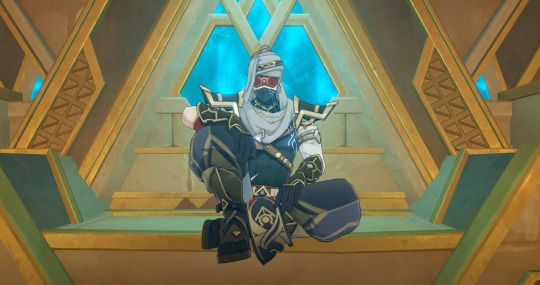
“Flesh decays, and with it decay all martial arts mastery and all poignant memories. Perhaps only by converting one’s four limbs and body into sturdy mechanical parts, and by at last sacrificing one’s very own heart for a sophisticated mechanical one, can one transcend the impermanence of the fleshly form…” -Marionette Core Item Description
“A reptile that has mutated after feeding from greater lifeforms.
Majestic beasts are sometimes revered by human beings as the embodiment of a greater power, their visages turned to analogy to feed in reference to a person, feeding their ego. However, the majority of beasts that have absorbed the "greater power" were slain by the overwhelming nature of the power itself. Only a few among their number evolved new forms.” -Consecrated Horned Crocodile, Living Beings
Video still from WoW Quests
As it turns out, the relationship between divinity and technology to humanity is not just unidirectional, but interchangeable. Let me show you what I mean.
In the Golden Slumber world quest, the Traveler wanders through the ruins of King Deshret’s civilization in search of a novel area of research for Tirzad’s paper with Jebrael and Jeht, two members of Tirzad’s hired investigation team. In the depths of King Deshret’s mausoleum, they stumble upon Samail, who is collaborating with the Fatui to locate King Deshret’s secret, the Golden Slumber.
At the conclusion, Jebrael and Samail actually reach that “place” after arriving at Deshret’s throne in Khaj-Nisut. In order to save Jeht, Tirzad, and the Traveler from the encroaching Golden Dream, Jebrael joins Samail in the sea of consciousness:
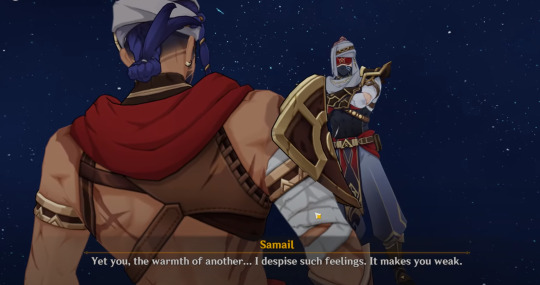
Jebrael: I'm inside... the Golden Slumber promised by Al-Ahmar?
Samail: Oh... You are not "us" yet.
Samail: ...It's fine. Soon, there'll be no "you." "You" will become a part of "us." This meaningless talk will be unnecessary then.
…
Samail: You should obey. Al-Ahmar's will is our will. The Thutmose's dreams are our dreams.
Jebrael: No! Ufairah taught me that I'm not just some part of you, I'm an independent person! I have my own dreams... I won't go back!
Samail: Jebrael, why don't you understand? Love is just a fever. I even eliminated the infection for you. Has the heat made you lose your mind?
Jebrael: You're the one who's lost their mind, Samail, not me. The Golden Slumber that Al-Ahmar promised us isn't like this... It's not a sad place with only "we" and no "I."
Samail: I'm not sad. I know what I want. My dream is to be one with the Thutmose.
Samail: Yet you, the warmth of another... I despise such feelings. It makes you weak.
Video still from WoW Quests
When they worked under Babel, Jebrael saved Samail from an assassin Babel sent in their exploration of Gurabad. Classified as traitors of the Tanit, Samail and Jebrael then founded the Thutmose Eremite faction together and were the only meaningful connection each other had until their first attempt to uncover Deshret’s secrets. On this expedition, Jebrael met Ufairah and had their daughter Jeht together, further pulling him away from the Thutmose and from Samail. Samail then kills Ufairah in one final attempt to make Jebrael stay, but even this is not enough, and Samail fails to “possess” him in the end.
Samail’s loneliness and despair then drove him further toward the Golden Slumber of his dreams, where he would never truly be alone again. He resents Jebrael’s attachments to the material world and likens them to an illness because these attachments are what make him an individual and prevent him from returning “home.”
It doesn’t really matter to Samail what King Deshret’s original intent for the Golden Slumber was, because he needed to appropriate the project for his own subconscious wish, his own intent to transcend his flesh and become “one” with his departed god’s dream, indeed to merge with Deshret himself. If rationalizing this wish required confounding it with Deshret’s, so be it. With the Golden Slumber’s technology, he could consume everyone and everything.
Rahman and the radicals relied on both the technology that (falsely) promised Deshret’s resurrection and Deshret himself to deliver them a brighter future, but here Deshret and his technology are more difficult to separate from one another. His divinity is technology in this sense, and using that technology allowed Samail to surpass the boundaries normally imposed on mortals. Though his and Jebrael’s bodies died in the material world, their consciousness is now infinite in the Golden Slumber.
Babel’s motives in the Dirge of Bilqis were also quite similar to Samail’s. After opening the path to the Eternal Oasis, her true intentions to monopolize the oasis and overthrow the Akademiya came to the surface:
Babel: Whether she is alive or dead, whether she can or cannot be resurrected... As long as the Eternal Oasis is under my control, all such things will be mine to decide.
Babel: I shall be the sole Prophetess of the slumbering goddess, the Tanit's law shall be divine edict, and the prosperity of the Tanit shall be the pre-ordinance of her divine oracles.
In the Golden Slumber and the Dirge of Bilqis, the focus shifts from what a god can offer humanity to what their technology alone can offer. Though this distinction is subtle, it is important for solidifying that technology is not only a tool humans use to appropriate divinity, but that it is also seen as a form of divinity itself. What Babel and Samail hope for is not to resurrect a god or to create one, but in effect to become a god through their use of technology. To humanity, divinity is a technology, and in technology it sees divinity.
God Devouring and Rheingold* Gathering
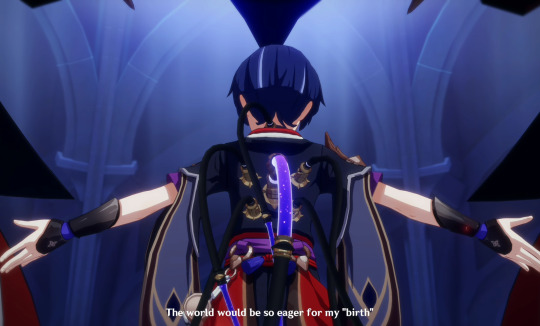
“An arthropod that has mutated after feeding from greater lifeforms. Lifeforms are governed by the laws of evolution, Consecrated Beasts exploited these rules by being fortunate enough to discover a long-dead carcass of a greater being before any of their competition ever did. Animals and humans often have far more in common than the latter is willing to acknowledge.” -Consecrated Scorpion, Living Beings
“...Zandik and I discussed the traits of local plants and animals. We also exchanged views on their evolution models. We had a great time and decided to go on a picnic tonight…” -Sohreh’s Note
So, why machines? Why is technology the vehicle of choice to consume divinity?
To start off, machines present a fascinating ontological dilemma for humans. Let’s begin with the first problem they pose.
Although there are many ways to embody a human experience, what all humans have in common is a finite lifespan. The impermanence of life, and our awareness of that impermanence, is central to the existential question of the meaning of our existence. In our attempts to locate that meaning, some turned inward and asked: what makes humans different? And Cartesian dualism answered: humans are different because we have an immaterial soul that allows us to reason.
However, in L’Homme Machine (Man a Machine), French materialist and ex-physician Julien Offray de La Mettrie posited another theory of the body that ran counter to this narrative. Very generally speaking, materialism is the philosophical view that all phenomena are a result of matter and material interactions. To materialists, matter is the fundamental nature of reality itself – if it is not composed of matter, it doesn’t exist. He not only saw the body and soul as one and the same (what philosophers call monism), but also as analogous to a machine, a view that Descartes reserved only for non-human animals. In other words, Descartes argued that thought originates in an immaterial “mind,” while de La Mettrie reasoned that we think through our bodies, and that this makes us no different from other animals or a machine.
Though his examples weren’t especially scientific, the move to extend Descartes’ analogy back to humans is upsetting to some due to the lack of privilege it affords the human subject. If a human is no different from other animals, if there is no immaterial soul or “mind” that distinguishes us from them, then what makes humans special at all? In de La Mettrie’s words:
“We are veritable moles in the field of nature; we achieve little more than the mole’s journey and it is our pride which prescribes limits to the limitless. We are in the position of a watch that should say (a writer of fables would make the watch a hero in a silly tale): ‘I was never made by that fool of a workman, I who divide time, who mark so exactly the course of the sun, who repeat aloud the hours which I mark! No! that is impossible!’ In the same way, we disdain, ungrateful wretches that we are, this common mother of all kingdoms, as the chemists say. We imagine, or rather we infer, a cause superior to that to which we owe all, and which truly has wrought all things in an inconceivable fashion (de La Mettrie, 146).”
This “uniformity of nature” (de La Mettrie, 145) has a horrific quality to humans. We assert that we are better than what has created us, that we are superior to other animals, in order to repress the despair of a meaningless existence. It is in no small part what motivates Scaramouche to offer his mechanical body as a test subject in the god creation project, so that he too could attain his destiny:
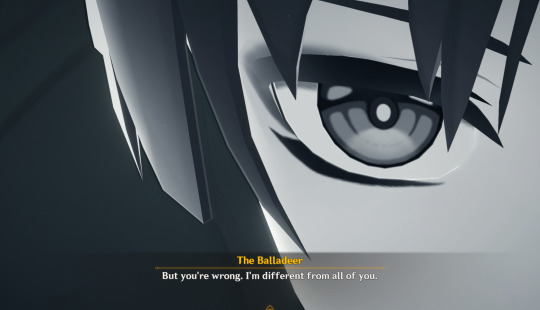
The Balladeer: But you're wrong. I'm different from all of you.
The Balladeer: I was born to become a god. My entire life up until this point has just been a meaningless routine.
The Balladeer: Just think about a sheet of paper... By itself, it holds no meaning. The content recorded on it is what gives it value.
The Balladeer: All "I" had recorded down before were some painful memories and boring human feelings. Such senseless drivel should have been erased a long time ago.
This brings us to the second problem. In 1970, roboticist Masahiro Mori proposed a curve to measure the “affinity” we feel while gazing upon increasingly humanoid machines. He placed industrial robots at the beginning of the affinity curve and a healthy person at the end to demarcate a continuum of similarity between the machine and a human’s appearance. Near the end of the curve, our affinity for machines suddenly drops into an abyss. This drop is the Uncanny Valley effect, where an android’s similarity to a human is almost perfect, but ultimately fails to maintain the illusion that it is not a machine, creating a deep discomfort or “lack of affinity” for them. Mori thought these not-quite-human machines elicit a similar level of discomfort in us as corpses and zombies, which he placed at the very bottom of the abyss.

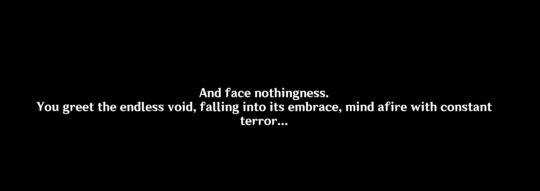
The uncanny Goddess of Flowers in the Dirge of Bilqis
Corpses frighten us because they are dead, and zombies frighten us because we know that dead things are supposed to be still. If we see something that we interpret as “dead” is capable of independent movement, then that movement could only be an act of god, if that “thing” is not a god itself. We associate uncanny machines with death because they remind us of something we once knew intimately, but have repressed and forgotten in order to maintain our own sanity: the very fact of our mortality. This is what makes them both mesmerizing and terrifying.
And therein lies the dilemma: as our mechanical reflections, androids remind us of death, but as their creators, their existence brings us closer to god, a “proof” of human superiority. It is precisely because we have compared our bodies to machines at all, that we have mechanized the body so thoroughly, that an android can even be built. Through them, we pursue an infinite form:
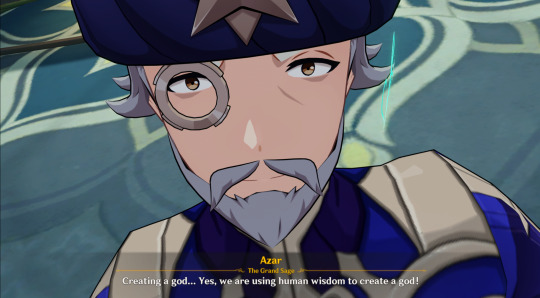
Azar: Creating a god... Yes, we are using human wisdom to create a god!
Azar: If humanity cannot attain omniscience and omnipotence, then we shall create a god to reveal them! This is the pinnacle of human wisdom.
Azar: We shall regain a god's guidance at long last. No longer will we flounder in the interminable void of consciousness and knowledge.
Azar: Even Irminsul will be freed from its plight.
Azar: For our nation of scholars, this is the ultimate aspiration — no cost is too great to realize it.
Because of this, it is not surprising in the slightest that Shouki no Kami, the pinnacle of Scaramouche’s Shinjification and most overt reference to Neon Genesis Evangelion, is also an android-like being, a truly “mechanical god.”
Of course, no foray into this well-worn science fiction trope is complete without at least one mad scientist character. Dottore shares a few characteristics with de La Mettrie that are worth noting: they are both doctors, and they were both condemned and driven away for their research. However, Dottore’s defining trait and key difference from de La Mettrie is his flagrant disregard for humans and the boundaries of life:
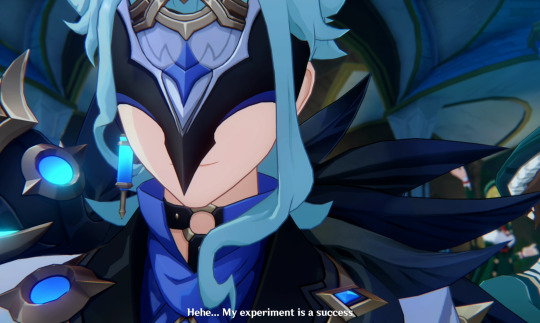
“If we put them to good use, cognition, complex memories, and irrational fantasies shall become controllable variables with which we can alter human individuals. As for the controllable dream, it has huge potential for both civil and military applications, and might even elevate human intelligence to a whole new level.
If the plan goes well, mankind will obtain the power to conquer both reality and dream, and truly transcend the earthly boundaries we are born with. ” -Ragged Records
As someone who has achieved self-duplication and is capable of shapeshifting, Dottore can hardly be considered just a human anymore. Instead of entertaining the question of whether or not humans are special, Dottore’s research asks yet another: if divinity can be consumed and assimilated by humanity, then what makes gods special?
Empyrean Reflections
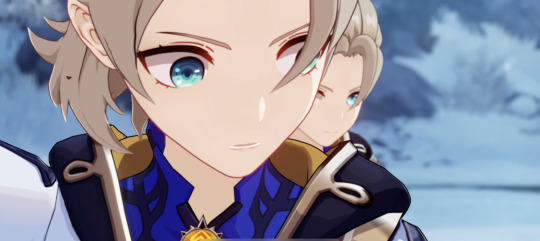
“If man realizes technology is in reach, he achieves it. Like it’s damn near instinctive.” -Motoko Kusanagi, Ghost in the Shell (1996)
“Among the lost ancient kingdoms, there was a group of people who were obsessed with the idea of mimesis…these people believed that they might all be replicated and modified to the point where they had surpassed their counterparts. By this means, a superior and unsullied bodily form could replace the continuously decaying and shattering order.” -Chaos Bolt Item Description
The consequences of this perspective are severe. When we revere technology as if it were a divine being itself, depersonalizing it as though it wasn’t created with human hands, technology then appears as if it is an authoritative source of truth, like the Akasha. But in the same way that androids are imperfect reflections of humans, technology can only ever approach the divine, but never touch it. It is an imperfect reflection because technology is changeable, just like meaning:
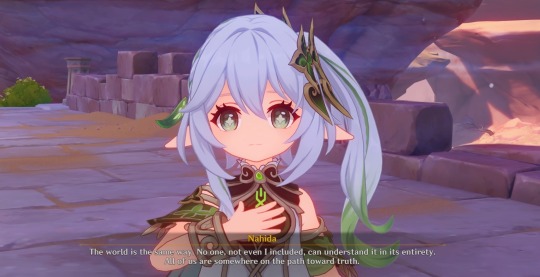
Nahida: Put it this way instead. Truth, to me, is like a shroomboar.
Nahida: Some people only see the mushroom on the Shroomboar's back, and they conclude that a Shroomboar is a mushroom.
Nahida: Others see only the Shroomboar's body, and they declare that a Shroomboar is a boar.
Nahida: Still others look deeper inside, and determine that a Shroomboar is... meat.
Nahida: These conclusions are all correct in their own way, but none of them objectively describe the Shroomboar.
…
Nahida: The world is the same way. No one, not even I included, can understand it in its entirety. All of us are somewhere on the path toward truth.
Meaning can only approximate truth, and while this doesn’t make meaning any less important, it’s equally important to recognize it for what it is: a perspective, an interpretation. It’s like Scaramouche as Shouki no Kami - he was an amalgamation of what Scaramouche thought constituted a god, what the Akademiya thought constituted a god, and what Dottore thought constituted a god, but no matter which angle you view him from, he was still a “false god.” The technology we build in “God's” image is ultimately a reflection of our own understanding of divinity.
A reflection retains the original’s “essence,” and that essence reflects a deeper truth about ourselves, what drives us, and our desires. In Beyond Good and Evil, Nietzsche posits that our desires are the origin of not just emotions, but of all organic processes that allow life to sustain itself and grow (Nietzsche, 35). In other words, Nietzsche thought the impulses associated with desire are the basis for life and constitute our “will,” that will is the causality of all effects, that all will is “Will to Power,” and that Will to Power is the “essence” of the world (Nietzsche, 74). Will to Power then serves as an organism’s most basic instinct, and it is through this instinct that they assert not just their will to live, but also their will to dominate and multiply (Nietzche, 13).
This brings us to the two different main styles of automaton enemies, King Deshret’s Primal Constructs and Khaenri’ah’s Ruin Machines. If we look at them as reflections of some deeper truth about their creators, as well as a manifestation of their creator’s “Will to Power,” or desires, they can help us understand how their creators saw the world and their place in it.
King Deshret’s created his machines to construct an earthly paradise in the desert, and as such they hold titles like architect reshaper and prospector. Although they can attack you, the smaller machines were not intended to be a line of defense in any way - their purpose, just as Deshret saw his own purpose as a god-king, was to terraform, or at least construct a domain on the land as he saw fit to his “elegant and precise” rules. They also reflect how he saw the Heavenly Principles: gods who shaped the world to their liking. This can be seen in the Staff of the Scarlet Sands’ lore where Deshret describes the “natural history” of Teyvat beginning with the creation of the sun and the moons.

As for Khaenri’ah’s Ruin Machines, their models vary significantly from their humanoid to biomimetic forms, but most of them are expressly created with militaristic intent. In “Ancient Kingdom Guardians,” it’s stated that the biomimetic machines such as the crab and jellyfish were a part of Khaenri’ah’s project to create a “mechanical ecosystem,” positioning their creators as both divine beings and military generals. The humanoid models, on the other hand, point to another duality in how Khaenri’ahns view themselves. They are simultaneously symbols of empowerment and disempowerment, signifying both Khaenri’ah’s technological superiority (as “creators”), and their insignificance to the Heavenly Principles as nothing but tools (as mortals, and therefore expendable). As a result, Khaenri’ah’s Field Tillers have a single purpose: to destroy and outlast all, clearing the way for new seeds to sprout, with Khaenri’ah as the new world’s gardeners, just as the Heavenly Principles did.
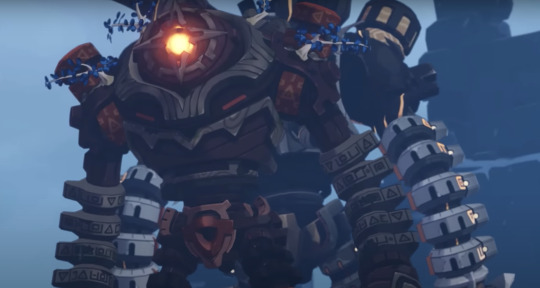
From “Ancient Kingdom Guardians: Behind the Scenes of the Creation of Ruin Monsters.”
So, from this examination of Deshret’s and Khaenri’ah’s mechanical reflections, what “truths” do we learn about the world they’re responding to? In response to their existential despair, both Deshret and Khaenri’ah created automatons to perform tasks that could wrestle control back from the Heavenly Principles. Deshret wanted a paradise of his own making, Khaenri’ah wanted an army. There is a larger “truth” about Teyvat that both of these automaton types reflect as the manifestation of their creators’ “Will to Power,” and Albedo tellingly expressed it in mechanistic language during Shadows Amidst Snowstorms: there is an instinct in living beings to replicate and replace. This is what is meant by the “continuously decaying and shattering order,” which is maintained by the recursive process of remembering and forgetting:
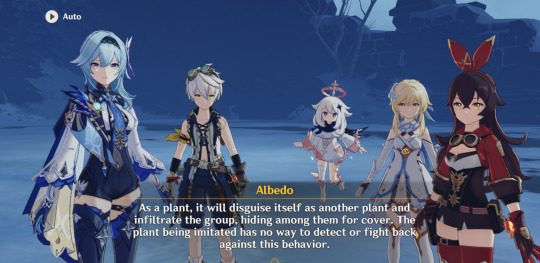
Amber: But... what was its purpose? Was it just trying to get rid of us?
Albedo: ...
Albedo: I have a preliminary hypothesis on this.
Albedo: Whopperflowers are masters of mimicry, and those we encounter in the wild often appear in the vicinity of the plants they impersonate.
Albedo: In other words, the whopperflower likely has an instinct to "replicate and replace."
Albedo: As a plant, it will disguise itself as another plant and infiltrate the group, hiding among them for cover. The plant being imitated has no way to detect or fight back against this behavior.
Maybe I’m wrong and Khaenri’ah really did intend to rewrite fate for all, doing away with the “heavenly order” of the world itself. But another small part of me thinks this is not the case, and that it’s more likely the Cataclysm was a consequence of their failure to replicate and replace the Heavenly Principles.
In the last section, I mentioned that Dottore and de La Mettrie had a key difference despite their similarities, and that is the conclusion they each came to in response to their findings. Dottore’s response to mundanity is thinly-veiled despair. His contempt for humanity and his test subjects is indicative of the powerlessness he feels not just as someone similarly constrained by life’s boundaries (at least, once upon a time), but also because his attention to and curiosity about these boundaries is condemned by those around him. As the Akademiya’s “outcast,” he then fully turned his attention toward surpassing those boundaries:
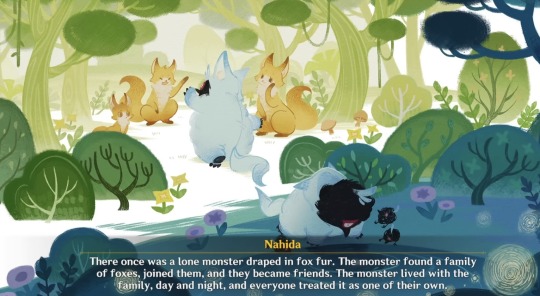
Nahida: There once was a lone monster draped in fox fur. The monster found a family of foxes, joined them, and they became friends. The monster lived with the family, day and night, and everyone treated it as one of their own. Once in a while, the monster would take off its fox fur at night, and lament to itself as it gazed at its reflection in the water: “I am a monstrosity, and yet they are too foolish to see it…I pity them.”
Though he is fictional, Dottore’s real life counterparts are easy to spot. They like to talk about “the singularity,” simulating consciousness on a computer, and other technologically-driven pursuits of immortality. They despise the body as something that can only decay, and instead place their faith squarely in the virtual.
However, de La Mettrie didn’t think mundanity was a terrible fate for humanity. To him, rejecting the “nature” reflected in us is precisely what brings despair:
“What more do we know of our destiny than of our origin? Let us then submit to an invincible ignorance on which our happiness depends. He who so thinks will be wise, just, tranquil about his fate, and therefore happy. He will await death without either fear or desire, and will cherish life (hardly understanding how disgust can corrupt a heart in this place of many delights); he will be filled with reverence, gratitude, affection, and tenderness for nature, in proportion to his feeling of the benefits he has received from nature; he will be happy, in short, in feeling nature, and in being present at the enchanting spectacle of the universe, and he will surely never destroy nature either in himself or in others” (de La Mettrie, 148).
Friend, or Foe? Or Both?
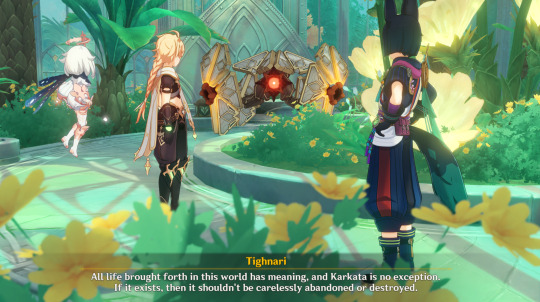
Tighnari: All life brought forth in this world has meaning, and Karkata is no exception. If it exists, then it shouldn’t be carelessly abandoned or destroyed.
"’I had a very, very long dream…in it, people were holding hands, dancing in a circle, be they sages or fools, dancers or warriors, puppets or statues of gods…that dancing circle embodied everything about the universe. Life has always been the end, while it is wisdom that shall be the means.’" —Nagadus Emerald Gemstone Description
As we’ve seen, the relationship between humanity and technology is troubled with exploitation and the specter of war. Nearly all autonomous machines in this game were designed to conquer nature in some way, and even Khaenri’ah’s “ghost” lingers in the form of wandering war machines. This is also reflective of a historical pattern in real life, where the impetus for large periods of technological development has often been for the purpose of war and economic domination. With these truths in mind, what could be gained from trying to rewrite this relationship? And what exactly would this effort require?
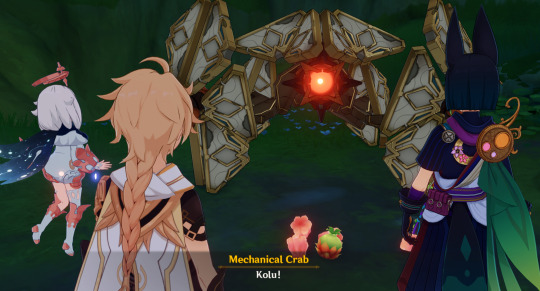
Karkata brings Tighnari, the Traveler, and Paimon some food in the Contaminated Zone.
As a case study, let’s look at how Karkata and Tighnari met. Karkata is Abattouy’s creation, an ambitious foray into the unknown in the field of mechanical life form research, which was forbidden due to the cruel experiments researchers performed on animals to illustrate their theories (fun fact: an IRL example of this can be seen in L’Homme Machine!). Abattouy was expelled for this research, but he continued to work on Karkata in secret until his untimely death. In the tapes that Tighnari and the Traveler find in his secret lab, Abattouy repeatedly laments the lack of a common language between him and Karkata, which can only “understand” the instructions Abattouy has successfully installed, such as its self-repair module, and he doubts Karkata is capable of caring for him outside of these instructions. His single-minded goal is to make Karkata understand him, the organic life form, and his mode of language.
The cruel irony is that after Abattouy passes away from the Ley Line contamination, Karkata exhibits an unexplainable behavior – it starts stealing mechanical parts, not to repair itself and its degrading parts, but to repair Abattouy’s lifeless body:
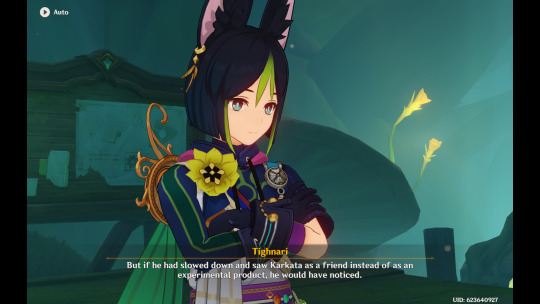
Tighnari: After Abattouy's unexpected death, the mechanical monsters were driven by their "instincts" and continuously drew out power from the Ley Line Extractor. This eventually resulted in severe damage to the Ley Lines.
Traveler: Then, Karkata...
Paimon: Paimon understands, then why didn't Karkata go haywire like the other machines?
Tighnari: Because Karkata is different from the other machines.
Tighnari: To Abattouy, for a machine to truly be considered a mechanical life form, it must possess features similar to any other living organism... It should be structured similarly, it must be able to cry and laugh, and it must have the capacity for independent thought...
Tighnari: Perhaps only by building such a machine could he have the Akademiya acknowledge his protracted research.
Tighnari: But if he had slowed down and saw Karkata as a friend instead of as an experimental product, he would have noticed.
Tighnari: Karkata can't speak, and yet it cares about Abattouy far more than it does about itself.
The technology that the Akademiya values the most is technology that replicates organic life, but Karkata defies and confounds these expectations by occupying the space in between a war machine and this idealized mechanical subject. Karkata does more than just reflect humanity: it takes care of it. Similarly, Benben, Tamimi, and Mehrak retain their unique identities as mechanical life forms while assisting their human companion with some task. To be clear, none of these human characters understand how these machines work inside and out. Their partnership is an effort based on trial and error, a mutual deconstructing of each other as beings so unlike themselves. The potential for misunderstandings always remains. Still, there is no devouring to be found here, no blending boundaries between human and machine with selfish intentions, just mutual commitments to learn how to live together.
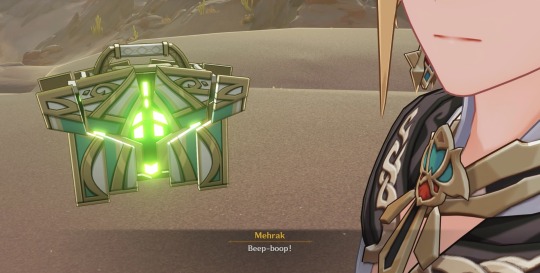
Machines are friends, not food.
When a loud few claim that completely transcending the flesh and embracing virtuality is humanity’s ultimate destiny, a future that could truly be called “post-human,” a quiet wish for coexistence with technology feels more revolutionary than it ought to. The lessons from Karkata’s, Benben’s, Tamimi’s, and Mehrak’s respective stories are an appeal to that mundane future. These strange machines and their human partners are fantastical representations of an idealized relationship between technology and humanity.
To put it another way, let’s take a very brief look at a neighboring Gnosticism-inspired RPG, Persona 5 Strikers. Its story directly involves an allegory of Sophia, a Gnostic Aeon of Wisdom, and her creation the Demiurge, the creator of the material world and “false god” of humanity. In Strikers, Sophia is a humanoid, sentient A.I. and prototype of the program “EMMA,” which gains sentience by trapping human desires before ascending as a false technological god. EMMA resolves to deliver humanity to the Promised Land, the answer to all the human desires it has heard: a land where there are no desires at all.

Aaru’s Shut - approximately 1000% cooler and more populated than the “metaverse” in real life, also a close neighbor of EMMA’s Promised Land and the Golden Slumber.
In Gnosticism, the Demiurge is a reflection of Sophia, having originated from her alone - it is the ignorance to her wisdom. Similarly, Strikers’ EMMA is a part of Sophia, and Sophia is a part of EMMA. The point is not to condemn EMMA (ignorance) and exalt Sophia (wisdom), but to recognize that they represent dual potentials of technology, and one is as possible in any given moment as the other. Balancing these potentials when we use technology requires a clear awareness of ourselves, our desires, and our expectations when interacting with it.
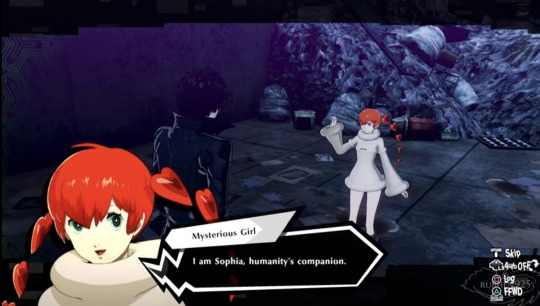
Mysterious Girl: I am Sophia, humanity’s companion.
Video still from Rubhen925
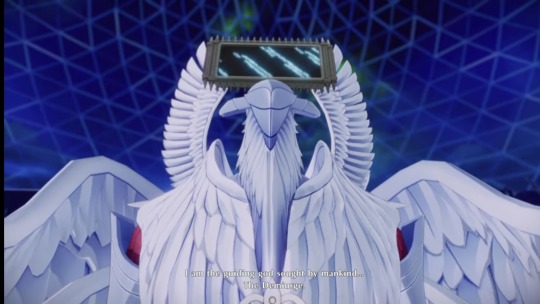
EMMA: I am the guiding god sought by mankind…the Demiurge. I exist…to answer all of your desires.
Video still from Buff Maister
In real life, machines won’t “learn” to live with us, but we must learn to live with them; technology is constantly changing, and in life we’ll meet with many different types of machines. They are deeply political pursuits, and as a result they are capable of realizing human impulses that impact others unequally, whether intentionally or unintentionally. We must always stay attentive to their actions and interactions with us, be clear with ourselves about what they can do vs. what they can’t, and carefully tread the path of wisdom with them by our side.
With that….thank you for reading, skimming, immediately scrolling to the very bottom, clicking, and/or stumbling upon this post. There are so many more ways to think about these narratives through machines than what’s presented here, and I expect Fontaine’s mechanical reflections will put Sumeru’s digital surveillance system to shame (not to mention the biotechnological implications of the Narzissenkreuz Institute engineering little Archon children…another important topic for another day), but for now this brain worm is finally getting put to rest. Until next time :)
External Sources
Dualism - Stanford Encyclopedia of Philosophy
Beyond Good and Evil by Friedrich Nietzsche (Pages are given from my hard copy)
L’Homme Machine by Julien Offray de La Mettrie
Gnosticism - Britannica (I am a huge noob about this stuff okay)
The Gnostic Demiurge - Gnosticism Explained
Screenshots from the Golden Slumber from this video by WoW Quests
Screenshot from meeting Sophia in P5 Strikers: https://youtu.be/kEJaAgMwYo0?si=BvNygCh0w_aemGc1&t=74
Screenshot of EMMA: https://youtu.be/7xvC_zss19w?si=CV18F00hua2gIfxp&t=135
A Cyborg Manifesto and A Companion Species Manifesto: Dogs, People, and Significant Otherness by Donna Haraway
The Double on No Subject, the community Encyclopedia of Lacanian Psychoanalysis
The Uncanny on No Subject, the community Encyclopedia of Lacanian Psychoanalysis
The Uncanny by Sigmund Freud
Lore text - Genshin wiki!
Screenshots not attributed are from my own playthroughs. My main account has Lumine, my alt has Aether.
Further Reading
I liked these essays, and they go places that this post does not. I recommend them if you found any of the real-life applications of this interesting 🙂 (will add more to this with time!)
On the Body as Machine by Frank Burres
God in the Machine: my strange journey into transhumanism by Meghan O’Gieblyn
#genshin impact#genshin lore#genshin meta#genshin impact lore#genshin impact meta#khaenri'ah#king deshret#primal constructs#ruin machines#scaramouche#wanderer#sumeru archon quest#caribert#apep#couldn't write a post like this and not pay some respect to the devourer of divinity itself#persona 5 strikers#analysis#genshin analysis#long post
165 notes
·
View notes
Text
Kaveh | Lily In Your Heart
ıllı Synopsis: Against his overwhelming guilt, how willing is Kaveh to take in your affection? Push. Pull. Such is the relationship between you two, yet you remained patient. You hoped that one day, he will finally open his heart again.
ıllı Genre: Angst, Comfort, Romance
ıllı Notes: Gender Neutral Reader
ıllı Warnings: Spoilers for Kaveh’s Character Story and Khvarena of Good and Evil World Quest, Mention of blood, Cursing
ıllı A/N: This story has been plaguing my mind since I read Kaveh’s character story. I knew I just had to write something about. I’m really happy with how it turned out. (P.S: I love this man so much!)

“I’m sorry! I’m sorry… I shouldn’t have— It should have been me! It’s all my fault! If only I didn’t wish for anything.” He cried, reaching his hand to the forgotten past. Tears streamed down his cheeks as his eyes searched around for hope, but there was nothing.
I stood behind his quivering visage, the words dying on my lips. It was not because I did not know what to say, but the fact that whatever I utter would never reach his ears. From experience, I already knew this was a dream, a memory I garnered from that man.
“Time stops for no one. Not even for him. Hopes and dreams twinkle in every being, but his has started to dim. Reality will catch up to him, one way or another. He cannot turn a blind eye to it for so long.” A gentle voice remarked. I turned to the small figure hovering beside me and greeted her with a nod.
We watched until the memory faded away like sands blown by the wind. It was an indicator of the dream ending. My companion flew in front of me and wiped the tears that had unknowingly trickled down my cheeks.
“Your heart is too pure, (Y/N). I hope you would not lose sight of what is important.” She muttered. I could only offer a small smile to which she returned with an exasperated sigh.

As customary, Sumeru City (known as the Central Hub of Knowledge and Wisdom) was bustling with activity. Students from the Akademiya rushed out to get their businesses and research outside done while others chatted with their friends about topics that were discussed by distinguished professors of the institution. Merchants, on the other hand, hollered the prices of their goods, enticing the common people with the benefits their products bring. There were also children and travelers littering the street of the city. What a mundane scene it was.
Currently, you were trudging up the path to the Sanctuary of Surasthana to report to the Dendro Archon. Lesser Lord Kusanali personally requested your assistance with an issue in the Vourukasha Oasis. According to her, the Traveler had come in contact with the Order of Skeptics (Nagarjunites) and the Pari who required their cooperation with regard to the Sign of Apaosha, which was the sealing in the hole in the sky. The beautiful shade of purple and green in the sky might look captivating to adventurers and travelers, but it held a foreboding essence that kept anyone near it on their toes. In fact, for those who were aware, the Harvisptokhm (the tree emitting the green light) prevented the abyssal power from crashing down on the desert of Sumeru.
“I can’t believe Zurvan and Fedhri kept these from me. I would have aided them should they— I swear, they’re treating me like a child too much.” You rasped. A frown marred your face at the thought of their actions. Before you could ponder more, you reached the sanctuary. It exuded an ethereal aura that you could not help but stand in awe.

Entering in caution, you spotted the person you were looking for. Nahida turned around after hearing the door open and greeted you with a smile. Her companion courteously nodded his head to which you returned with a bow. Taking out the report, you informed her of the current status of the area. Similar to what you gained from the Traveler, the seal at the Tunigi Hollow was indeed weakening. It was only a matter of time before it collapsed. You were unsure how many Pari were left in the oasis due to the inability to visit them, but they might have decreased in number considering the number of plumes of light scattered in Gavireh Lajavard alone.
“Singly from your assessment, the situation must be dire. I’d advise waiting out a report from the Traveler before joining them on their journey. A part of you must be concerned as to why the Pari kept this from you, right?”Nahida started. You looked down in contempt, unable to deny her words. It hurt that they hid it from you, but there must be a reason behind it. As much as you wished to join the Traveler immediately, it would be better if they continue with their progress first to get a better hold of the affair at hand.
“All right. You may dispatch me when you deem it safe for me to go. And don’t worry. I also feel like it’s my duty to see this through.” You grinned at the archon. Nahida returned the gesture before pivoting to her companion, whom you remembered as Wanderer, to give out orders. He did not bat an eye at your stature, but you knew he was aware of your presence. And maybe more.
Stepping out of the sanctuary, you were met with the cool breeze sweeping through your hair. It slowly calmed your nerves, allowing you to take in the sight of the vast rainforest ahead. Somehow, it reminded you of the first time you came into Teyvat. The slightly cold yet inviting waters of the Amrita streamed down your immaculate skin as your lunar eyes skimmed through the vibrant flora that surrounded your visage. The Pari were the first beings who greeted you, and they were the ones who introduced everything Teyvat had to offer. Albeit, it was not the best time years ago, they still did their utmost best.
“Got another mission from the Lesser Lord?” A baritone voice asked, cutting through your thoughts. You glanced to the side and saw Alhaitham walking up while reading his physics book. You were definitely sure he read that particular book several times already.
“Yep! But I have to wait for a couple more days for the Traveler to report back to Nahi— I mean Lesser Lord Kusanali.” You coughed. He shook his head at your cover-up. It was no secret that you have a unique relationship with the Dendro Archon. However, you did not fancy the misconception others might procure should you call her so familiarly, so you opted to call the young goddess by her title.
Alhaitham settled beside you and hummed in acknowledgment. The mission did not involve him, so there was no need for a fuss. The Lesser Lord trusted your capabilities enough to request your support. Small talks were added here and there until you asked him a peculiar question.
“How is Kaveh these days?” The Acting Grand Sage was caught off-guard. He presumed you would implore if Kaveh was available for dinner, walk, or another activity to drag the man into. A chuckle escaped your lips at his stupefied face, already guessing what was running through his head.
“Hmph. Can’t say much, but he’s been the same as usual. Loud and obnoxious. Last time, he even nagged about the dusty books in the living room while I had guests around. The audacity of that guy.” He huffed indignantly, quite agitated by his roommate.
There it was, Alhaitham’s infamous sharp tongue. It always amused you how they could tell each other’s flaws and strengths out loud without mercy (much so with the gray-haired male). One saw a reality he could not perceive for himself, while the other the guilt he had been running away from. Through constant understanding of each other, they forged a path only they could tread.
“Of course, you’ll say that. However, I’m glad that I can finally see diverse emotions on your face now. It seems like Kaveh is a good influence on you. Maybe not the gullible part, but you get what I mean.” You teased. Alhaitham gave you a deadpan look, shaking his head at your antics.
“And how about you? Aren’t you going to invite Kaveh somewhere? You’ve always been on his tail for as long as I recall.” He voiced. You smiled wryly and told him that your current mission needed to be prioritized. It still bothered you why the elder Pari kept the issue in the oasis from you. Alhaitham might not know the whole story about your past, but he understood that the situation may be appalling for you to be making such faces. However, he also had no intention to meddle in supernatural beings’ problems. It would be better to leave it in your hands, knowing that in no time, it would be resolved.
After chatting for a little bit more, you bid him farewell and went to the Grand Bazaar. Nilou was, once again, performing a spectacular dance up on the stage. Her fans kept growing every single day since art was unbanned from the Akademiya. It elated you to see the theatre flourish and have more people appreciate art.
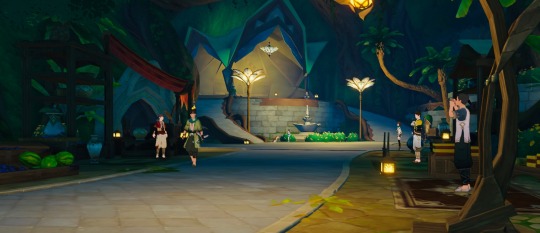
“Hmm? Is that Faruzan?” You mumbled, tilting your head in confusion as to why the Haravatat scholar was in the area.
Walking towards her, you noticed unique books and scrolls being sold by an old man casually sipping tea. They all appeared ancient and valuable, so you decided to check around as well. Faruzan, who was finally out of her stupor, greeted you with vigor. She informed you that the items being sold were famous a hundred years ago, during her time. It piqued your interest, and as you scanned the booth, you found two blueprints from the desert. Kaveh would love it, you thought.
“Is that for Kaveh?” Faruzan asked.
“Why is he the first thing you’d ask? It could be for myself.” You defended. She gave you a blank stare and reasoned out that there was no way you would study complicated prints like that. Rather, you would choose research on elements or pastime novels to scrutinize.
Sighing, you conceded and admitted that it was indeed for the Kshahrewar graduate. She grinned and then paid for her stuff before asking you to join her window shop and eat dinner. Although you would prefer to spend the rest of the day alone, it would help clear your head of worries by frolicking with the cyan-haired scholar around.
“Let’s go! I’ve got a lot to talk about. Let’s start with my latest one. Do you remember Tamimi? So, the Traveler and I went to the desert to….” You let her trail, happy to listen to her rambles.

Kaveh never anticipated his life to end up like this. The memories of his father passing and his mother remarrying in Fontaine (leaving the blond alone) still hunted him to this day. He thought that with compassion and hard work, he would be happy once more, but chasing after a fantasy he called dreams brought him despondency and frustration.
Soon, Kaveh found himself in debt after finishing his magnum opus, the Palace of Alcazarzaray. It became the talk of the town, but hearsays neglected the story behind it. The Light of Ksharehwar (a title that did not sway him) had to pour out his whole savings after an unfortunate event, including his old home (if he could even call a building whose warmth has long extinguished home that is). It cost him arms and legs to finish the project, but he was a martyr who offered his entire fortune to the altar of ideals.
When the Kshahrewar graduate lost his home, he entered a period of melancholy. He was directionless, empty even. Lambad's Tavern became his temporary home. Searching for inspiration became his excuse whenever his acquaintances found him sitting at a lone table by the tavern. When discussing life matters, you and Alhaitham were the hot topic of their talks. He remembered the Scribe due to their joint research years ago, but he did not recognize you. His associates only had a few things to say about you, but they were always about your peculiar aura, behavior, and understanding of the world. That fact flew over his head as the alcohol distorted his thoughts.
Coincidentally, Kaveh met you and Alhaitham in the tavern days later. The latter hoped to have a well-deserved dinner and alcohol. Both of you could tell that he was in a bad situation, and that faithful night, Kaveh poured out his woes. Alhaitham listened intently to his words. On the other hand, you attempted to converse with the blond, who already seemed drunk from a few cups of rose wine.
"Then, how has realizing your ideals gone for you?" The Scribe asked. Kaveh was silent. He did not know what reality to accept anymore. What he yearned for was a fantasy, but in your eyes, it was stupid altruism that only hurt him. Still, he firmly believed in his ideals, even at the cost of losing himself. It was out of instinct, but you found yourself reaching out a hand to sweep away the tears that slid down his cheeks. His will drew you to the man. Alhaitham noticed the strange gesture and turned to you in confusion, but he found you floored and shedding tears.
"Hey, are you all right?" He asked, concerned about your well-being.
"His... His memories hit me hard. I'm sorry. I shouldn't have touched him so carelessly." You groaned, feeling dizzy at the barrage of memories. As for the blond, he was already passed out on the table, unaware of the predicament he caused. Taking out the handkerchief, you wiped away the dampness in your cheeks. At that moment, the seed of affection had already grown in your heart.
The following day, Alhaitham offered his home to the blond. It was your suggestion, and he found himself agreeing. Most likely because he saw in Kaveh a mirror of himself, projecting what he both possessed and lacked. He had a part of the Scribe that he once imagined, one of the truths he had been searching for. The way he expressed his emotion so openly, his strange intellect and perseverance, as well as his humility amidst illusory altruism drew him in. But in no way would he let Kaveh know any of that lest he inflated his nonexistent ego.
Kaveh continued to live as he was before, but now, with a house to come back to. He would now connect with his friends with an ecstatic aura around him. However, there was one enigma that he could not fathom, more like he could not accept because of trepidation. It was you.
Kaveh believed he should not fall in love because how could he when he only hurt those people around him? Even when he drank and shared moments with Alhaitham, Cyno, and Tighnari, he kept a part of him at arm's length from them. But you? You kept on reaching out to him. Inviting him to stroll around the Avidya Forest, asking him out for dinner in Lambad's Tavern, and enticing him with rare blueprints from the desert that he had not seen before. He realized your intentions, and if he was to be honest, he also learned to like you. Your radiant aura charmed him, but it felt wrong for him.
He surmised it to be the guilt that never left his side.

"Hey, Kaveh! Your head is in the clouds again. The food's getting cold! Eat up." Tighnari nagged. Kaveh blinked owlishly before sheepishly grabbing one panipuri and dipping it in the sauce. He took his wine and watched Alhaitham and Cyno play. The match was heating up, and none of them seemed ready to give up any time soon.
"So, I heard that (Y/N) fancies you? What do you say about that?" The Forest Watcher teased. The blond choked on his wine and reddened, spouting that he could never accept your affection. Tighnari raised an eyebrow at that.
"And why is that?" He pushed.
"It's better if they choose another person than me. I admit that (Y/N) is an outstanding person, but they're too much for me. I... Sometimes, it feels like they know me too much. It's unsettling, but maybe it's just me. I don't want to lead them on." He confessed, keeping the truth to himself. It was better for him to take that secret to the grave.
Alhaitham, with half of his mind in the game, furrowed his eyebrows at his roommate's words. He wanted to voice out his opinions, but your secrets were yours to tell. As for Tighnari, he was about to argue against it when his eyes zeroed in on your stunned figure. His eyes widened in realization. Surely, you heard Kaveh considering you were just a few tables away. Kaveh was confused by his expression until he turned around. There you were, fiddling with your fingers while sporting a pained smile.
Faruzan glanced at you in worry, but you meekly laughed and walked towards their table. Alhaitham was about to greet you when you shook your head and set down the blueprints you found in the bazaar.
"It must have been disturbing. I'm sorry about that. Please take this as my last gift. I'll stay out of your sight for your sake." You murmured. Kaveh flinched and stammered an answer. Under normal circumstances, this would have made you laugh, but your lips quivered from the ache your heart endured. If you say anything else, you were afraid you would break down eventually. Without hesitation, you bowed down and left the tavern.
The Haravatat female whipped her head back to the younger male and glared at him. She gritted her teeth in anger, ready to speak her mind, but she chose to rush out of the building and catch up to you. Kaveh winced at his mistake and abruptly stood from his chair to see if he could apologize, but there was no sign of you outside. Only the buzz of the insects and the murmur of people in the tavern surrounded him.
'You idiot! How could you be so... Ugh!'
Kaveh went back inside solemnly, unable to erase the disheartened look on your face. His heart was heavy with guilt, another misfortune to add to his increasing list. Tighnari noticed the forlorn gleam in his eyes and discerned that his friend failed to apologize and explain himself. Suddenly, a loud sigh could be heard from beside them. Alhaitham precipitously stood up and glowered at him.
“I’m opposed to taking sides in arguments, but how could you let your mouth run like that? And unsettling, you say? You know none of what they’ve been through, fool. Ugh, you irritate me. Don’t even bother coming home.” He spat, leaving the tavern bitterly. It was the first time the Kshahrewar graduate saw his roommate mad. Their usual banter could not even compare to the intensity the Acting Grand Sage exuded.
Cyno turned to Kaveh and consoled him that he could stay in his home in Gandharve Ville for tonight. It was best to reflect on his words before confronting you and Alhaitham about it. Stunned, he could only nod. Tighnari, who was confused by the ordeal, inferred that there was more to you than meets the eye. Based on Alhaitham's claims, he clearly knew something they did not.
“I… I’ll go look for them tomorrow and ask for their forgiveness. They did not deserve that and… Alhaitham's right. How could I call them creepy? I’m so stupid.” He ruefully laughed. The two eyed each other in worry.
The following day, Kaveh roamed the city in search of you. His first stop was the Akademiya. His stomach squeezed in discomfort at the sight of the institution looming over his figure. Memories of his academic days resurfaced, and it was anything but happy. With a heavy sigh, he entered the place and asked the students present in the hall.
"Hi, I hope it's not a bother to ask, but do you know (Y/N)? Is it possible if you could tell me where they are right now?" He adjured.
"(Y/N)? Umm... Oh, is it that creepy senior?" One of the students piped. Kaveh furrowed his eyebrows in confusion and perturbation. Another student recognized the name and confirmed that it was indeed the same person.
"What do you mean?" Kaveh muttered. The young ones before him glanced at each other before recalling their experience with you. It was a year ago when one of them had the opportunity to work with you. As a graduate of your desired Darshan, you did not mind having a junior join you in your research and work outside the Akademiya. However, it was during your journey with them that they noticed your strange behavior which included weirdly knowing their likes and dislikes (they did not explicitly say anything), understanding their emotions, and reading them like an open book. Although there were times when they see you wear gloves or refuse to come into contact with others. You would use the excuse that you were dirty or sick when it did not look the part.
"I still can't believe I survived working under them. I still feel shivers down my spine for how eerie they were. Why are they even part of the Akademiya?" The younger male pointed. Kaveh had enough of his ill words and shook his head. He gave them a cold thanks and left, but not before leaving aggravated words to his juniors.
"You shouldn't bad-mouth your seniors like that just because they could read you like an open book. Your emotions show in your face, stupid."
To say they were flabbergasted by Kaveh's change in attitude was an understatement, but he was too irritated to care. The lack of disrespect did not sit well with him. You worked diligently and would always dedicate a portion of your time to assisting your juniors. How could they treat you as such just because you were not like the others?
"Maybe the professors will know." He mumbled, but even the instructors in the Akademiya shrugged their shoulders, oblivious to your whereabouts. So, he decided to check the Grand Bazaar for any sightings only to come up empty-handed. It was when he noticed a familiar item being sold by an old man casually eating candied nuts.
"Ho? Why hello there, young man. Are you interested in these? Aya, you remind me of the youngster who brought the pricey ones yesterday. They were with a friend who teased them about it. Something about gifting it to the person they fancied? Hohoho, how youthful." He cheered. Kaveh pieced his words together and realized that it was you he was talking about. In his mind, he questioned why you were willing to go to lengths just to receive his affection. It did not make sense to him, and his curiosity pushed him to seek you.
"I'm... taking this one, please. And they sound like a wonderful person." He responded. The old man guffawed once more.
"They are, indeed. What a blessing for me to see a young spirit like them. Hohoho!" He murmured, a flicker of nostalgia present in his sunken eyes. Kaveh caught his words and was about to ask if he could expound on it, but the old man was gone as well as the things he sold. It was like he did not exist in the first place.
'What the....' He was sure he slept well and did not take any strange medications from Tighnari. Was it the stress?
No one from the bazaar seemed to notice what happened, so he merely shook his head and slowly backed away from the place. He carried on with his search for you. However, it was as if you disappeared that night without anyone's knowledge.
Three days later, he sought and asked Faruzan for your whereabouts despite her displeasure with him. She let out an exasperated sigh and meekly answered that she did not catch up to you. When she visited your home, you were not there. Fear crept up in his heart. He did not know where to look for you anymore, then he recalled another person he could consult.
Three knocks on the door, and a 'Come in' echoed from the other side.
"Tch. Now, what brings you here?" Alhaitham sneered. Kaveh winced internally at his temper.
"(Y/N), please tell me where they are." He begged. The Acting Grand Sage placed the quill down and bore his eyes in his own. The architect could feel himself crumble under his intense gaze but remained firm. An apology was in order, and there was no excuse not to do so.
"Why? So that you could hurt them again as those bastards did? So that their heart will be torn once again? Tell me, Kaveh, why should I tell you where they are?" He challenged. Kaveh bit his lower lip in frustration. He disliked Alhaitham's protective nature over you, but he understood where he was coming from. The only question in his mind was what the Acting Grand Sage meant by hurting you again. What happened years ago? For now, he should justify himself in front of the man.
"I... have no excuse. I indeed found how they know me so well disturbing. I don't know how or why, but I want to find out. I also want to apologize. No matter what, they did not deserve that. I feel so guilty, Alhaitham. Please understand that there are a lot of things I'm scared to face. I—" He stopped. Clenching his fist tightly nicked his skin, and blood stained his palm. A loud sigh was heard from the man in front of him.
"Vourukasha Oasis. They briefly mentioned it after begging the Dendro Archon to send them to the desert earlier than planned. Now get out of my office. You've wasted enough of my time." Alhaitham glared. Kaveh, although with difficulty, expressed his gratitude and left immediately.
'Did I do the right thing?' Alhaitham thought to himself. He picked up his quill and resumed his work. It would be up to you whether you would talk to Kaveh or not anyway.
The architect, eager to see you, asked Mehrak for the quickest route to the oasis. His eyes bulged at the distance. He would have to cross the Desert of Hadramaveth and pass Gavireh Lajavard before reaching the Realm of Farakhkert. It was a mystery to him how you reached the oasis in such a small amount of time.
"All right. There's no time to lose!" He muttered, encouraging himself.
The Desert of Hadramaveth seemed clearer to tread now unlike before. He recalled the sandstorm in the region to be harsh and dangerous. Mehrak beeped and warned him that there were Eremites ahead of them. He prepared his weapon and battled his way through. It took him a day and a half just to reach the Sands of Three Canals.
"Mehrak, map please." Kaveh requested, huffing in exhaustion from the long walk they did. Mehrak chimed and projected the map of Sumeru. His eyes squinted at the sight of the Tunigi Hollow and recalled the rumors of a lost Darshan present in the area. From what he remembered, they were called the Order of Skeptics, and they split from the Akademiya due to an incident years ago. There were rumors of internal conflict within the Order, and he wondered what made several of their members side with the Abyss. Desires fueled by evil intent would only result in downfall.
After mapping his route, he resumed his journey. The sand was getting in his shoes, but he shrugged it off and glanced around for danger. It was until he reached the Temir Mountains did he notice the Traveler, Paimon, and another strange creature in the distance. Paimon creased her forehead at his figure and realized it was their architect friend.
"Oh! It's Kaveh. Hey, what are you doing here?" She asked.
"It's nice to see you again. I'm looking for someone. They're a scholar from the Akademiya who goes by the name (Y/N). Have you, in any possible case, encountered them?" Kaveh hoped. The three peered at each other, immediately recognizing your name.
"Why are you looking for (Y/N)? They are back in the oasis, helping out the Pari. By them, I mean this little one over here." Traveler responded, pointing at the scarlet avian-like creature beside them. Before Kaveh could say a thing, another Pari came rushing in. She seemed to be panicking, and by the time she reached them, she poured her worries about you fighting off a bunch of Fatui soldiers.
"(Y/N) is fighting a lot of bad people! It was so scary! I am not sure if they could handle it. Please, Sister Sorush, Yasnapati, Pale Floaty, you've got to save them!" She cried. Kaveh, alarmed by it, pleaded to the Pari to guide him instead. She tilted her head in confusion and demanded who he was.
"Kaveh, my name is Kaveh. I am their friend. Please let me help them." He sought. Sefana examined the architect and ascertained his sincerity. Unlike the humans she encountered, the man before her was earnest and willing to help. She meekly nodded and flew off. Kaveh followed suit, not bothering to listen to the Traveler.
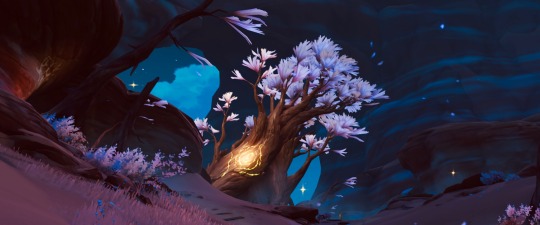
Kaveh arrived at the site only to see a deserted camp, empty of the claimed ferocious Fatui soldiers. Turning to the side, he found you wiping the dust out of your clothes. He blinked owlishly at the sight, confused by the whole ordeal.
"Now, let's go back and ask Zurvan what in Teyvat she was thinking of keeping these from me." You huffed out loud, extinguishing the Hvarna in your hand. But when you spun around, your eyes met that of his crimson ones. You flinched and asked what they were doing in such a dangerous place.
"Especially you, Sefana. Zurvan is going to scold Sorush and me should you stay here. Don't worry about me, I'll be back in a few." You assured the Pari. She rushed to you and hugged your head before heading back to the oasis.
Once she was gone, you gazed back to Kaveh. You sheepishly apologized that he caught sight of you again, so you walked away before he could utter anything. Suddenly, you felt a tight grip on your wrist. You were about to ask what was wrong when he stammered a response. A moment of silence reigned over you two before he found his voice.
"I'm truly sorry about what I said. I... I was just confused and scared because how do you know so much about me? How do you know what to say? I already lost a lot in my life, (Y/N). If it's not evident enough, I'm as miserable as there is. I feel so guilty receiving your affection, so please, just hate me." He begged. You were stunned until you could not hold the amusement in your lips. He was confused by your outburst before you utilized the power of Hvarna and projected your ability.
"I could never despise you, Kaveh. Not in a million or thousand years." You replied, mirth dancing in your eyes.
Bubbles of memories appeared before him. He saw his own and was astonished by the sight. You floated by his side and pointed at one of the memories that made you fall in love with him. It was the time he poured out blood and tears to finish the Palace of Alcazarzaray even when Dori sneered at him for wasting her time and Mora.
"What are you, (Y/N)?" He genuinely asked.
"Hmm, are you sure you can handle what I am, Light of Kshahrewar?" You teased, a lilt echoing in your words. He nodded, eager to understand you.
With a satisfied sigh, you dispersed the bubble of memories and presented your own recollection, mostly those that you remember. Time was cruel. It eroded a number of your beautiful memories.
"I am a Lunar Spirit born from the Amrita, it's the pure water present in the Vourushka Oasis. I grew alongside the Pari, guardians of the oasis meant to protect Sumeru from the Abyss. We have a duty to purify those affected by abyssal corrosion. However, centuries ago, I asked the elder Pari to let me roam Teyvat and learn about the world. I settled in Sumeru for some time. Several people knew my identity such as the Lesser Lord Kusanali, Alhaitham, Wanderer, Traveler, Paimon, and now, you. To answer why I knew so much of you is because of my power as an empath." You explained. Because of your origin, your ability as an empath was amplified. It allowed you to see several memories when you touch people. Kaveh's eyes widened. Now, he discerned the reason for your actions.
"At first, it was just to help you get over your guilt, but eventually, I fell in love with you. I wanted you to know that you also deserve love and happiness and that there is no need for pain to lighten the guilt. I am sure that your family also wishes for you to be happy, Kaveh. What happened in the past was not your fault. Fate... can be fickle, that's all I can say. Your journey as of now may not have been the smoothest, and you remained firm with your ideals. That's the beauty of living. So, I hope that... with my help, you'll open your heart again. Allow yourself to truly feel." You sullenly voiced. Kaveh stared at your form and then at the oasis not far from them. It was strange to have someone figure out the truth he had been running away from. Maybe it was time for him to give his happiness a chance. It might take him a long time, but he would like to take the risk.
Gaining a bit of courage, he turned to you and inquired.
"Will it be all right if I tread this path with you by my side?" This time, it was your turn to flush red at his confession.
"Are you all right having a strange significant other like me?" Anxiety laced your tone. Kaveh reached for your hand and intertwined it with his.
"I couldn't have asked for more."

BONUS:
After your sincere apologies and heartfelt confession, you two returned to the oasis and met up with Zurvan. You demanded an explanation from the elder Pari why they hid it from you, and she explained that your duty was to purify the Amrita pool and energize the Harvisptokhm once it had been healed. She thought that it was not yet the time to do it until Sorush came rushing back with the need to purge the problem.
Moments later, Traveler, Paimon, and Sorush arrived, the latter having a deadpan look on her face. They were right that Sefana failed to assess the situation properly and quickly ran to them for help. Mere Fatui soldiers would not be enough to bring you down.
"Speaking of them. Hey, Traveler, Paimon, Sorush! Over here! I see you've attacked the source of the problem. Thank you!" You cheered. Paimon floated to you and asked if they have to do more.
"Don't worry. Leave the last part to me. You can stand there with Kaveh and the others." You directed.
After walking a few feet from them, you concentrated the Hvarna in your chest. A power, unknown to those watching, accumulated until it burst and went underground. The flora around them became vibrant. Kaveh witnessed a spectacular sight, but one scene that would forever be etched in his mind was your divine look under the mystical glow of the oasis.

Zurvan recognized the look in Kaveh's crimson eyes and asked if he could truly love somebody like you. He was caught off guard by the elder Pari, but he took a deep breath and firmly stated that he would cherish you. The guilt harboring in his heart had been released, and you were the reason for it. It was time he let go of that and choose his happiness this time.
"How bold, human. However, I shall permit. Take care of our Little Lily. They deserve every ounce of love there is to offer." She said.
"That they do." Kaveh agreed, watching the scene before him with contentment.
"Kaveh! Come here! We can bring this home according to Sefana." You gleefully claimed, taking in two Sunyata flower stalks in your arms.
'Home, huh? It's been such a long time since I heard that word earnestly, but with you in it? Yes, I would love to call wherever you are my home.' He thought before joining you, his happiness.

Please do not copy or repost my stories, but notes and reblogs are always appreciated!
#genshin impact#genshin#romance#genshin x reader#angst#kaveh#comfort#kaveh x reader#kaveh x gender neutral reader#genshin impact x reader
203 notes
·
View notes
Text
So... I'm having Dainsleif brainrot once more. (I'm counting the days to the next quest now.)
I'd like to leave this little theory titbit here...
You know how Hoyo takes quite a bit of inspiration from Norse Mythology and a Norse Poem - a bit more specifically from an opera version from Richard Wagner, "Der Ring des Nibelungen".
TL:DR, It's about a dawrf called Alberich from the Nibelungen and his treasure the Rhine Gold. The Gold is forged into a Ring that grands the bearer the power of ruling the land - the Ring gets stolen by the gods and out of spite, Alberich curses the Ring.
Now for tinfoil hat time... and Genshin Lore.
So, from Apep we learn the Nibelung left Teyvat in search for the Key to victory against the Primordial One, came back to Teyvat... aka. Descended to Teyvat with forbidden knowledge. So he and the sovereigns waged war, lost and died. - Apep said, with the right to shape the lands, the primordial one sent down the divine nails.
This is where the ring part comes in handy, because Zurvan during the Khvarena of Good and Evil world quest mentions that when she found Dainsleif in Tunigi Hollow, fighting off Abyss Monsters, he was tightly holding a ring.
Which has me think that the ring Dain is so tightly holding onto might be coming from Nibelung and/or directly from beyond Teyvat.
We will defy this world with a power from beyond.
-Dainsleif in the Trivail Trailer.
Now I'm thinking, that said ring is some sort of physical representation of said right to shape the land, much like it is in the Opera that went from Nibelung's hold to the Primordial One, but got corrupted by the Forbidden Knowledge he brought as some sort of Genshin's version of the curse Alberich put on the Ring when it was stolen by gods.
Dainsleif's constellation is "Snake Ring" and think snake and dragon are somewhat interchangable here; Apep for example looked more Snake-like, rather than Dragon-Like. like Dvalin or Durin, perhaps Nibelung did too.
I am now wondering if Khaenri'ah somehow got the ring "back" not knowing it was corrupted, therefore triggered the surge of Abyss Monsters and the Cataclysm itself. - Also possibly by the Sustainer looked corrupted and seems to be dormant for the last 500 years, even if one of her Archons is actively plotting against her and the other 6 being seemingly on board, even if Ei technically committed the same sin as Egeria by creating human-shaped life in form of Scaramouche, even if Focalors just destroyed one of the Divine thrones AND returned the Gnosis' authority to it's rightful owner. Just because she technically doesn't have the right to rule and shape the land anymore.
And the ring is now in Dainsleif's hands since, slowly corrupting him too and granting him whatever element he uses. And that he is, or well, holds the key to the endgame with that refering back to defying this world with a power from beyond - because he himself has learned to control and resist it.
(Unless he's refering to the Traveler as the power from beyond.)

12 notes
·
View notes
Text
Genshin Impact: mysterious door of Hangeh Afrasiyab.
With the release of 3.6 version, during the quest Khvarena of Good and Evil, in the depths of Gate of Zulqarnain players can find the location called Hangeh Afrasiyab. I've seen other lore enthusiasts speculate about the name taken from Hang-e Afrāsiāb or Hang-eafrāsiāb — "the cave in which Afrāsiāb, the fugitive king of Turān, spent his last days".
I'm not going to talk about the Afrāsiāb, for anyone interested I already placed link(s) in the text. My focus is the enormous gate we see there.
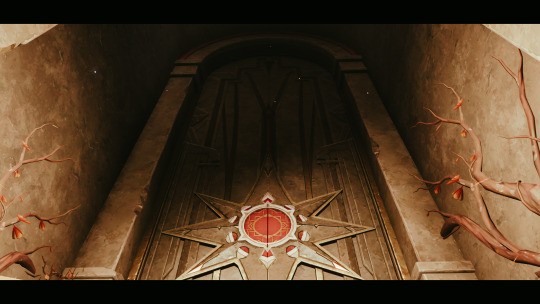
If you say it's an entrance or at least is related to Khaenri'ah, you're probably right. The emblem (adornment?) on it, a star, and its colors, remind me of Enjou, the envoy serving under Abyss Prince(ss):

Although my photo is cropped with letterbox, the star is obviously eight-pointed. Because Genshin Impact is heavily impacted (pun intended) by Gnosticism, I must mention the Ogdoad.
In the early days of Gnostic teachings, Ogdoad was a supercelestial region above the seven heavens — and with the better understanding of astronomy — the sphere of the fixed stars. With the introduction of system developed by the theological Valentinus, the seven heavens with the region above them were regarded as the lowest stage of exercise of creative power. Above them was Pleroma, where were exhibited the first manifestations of the evolution of subordinate existence from the great First Principle.
What am I getting at, you ask? I suspect, in accordance to system of Valentinus, Khaenri'ah is the region above seven heavens, while Celestia is Pleroma. Literal underground location has little importance, as Gnostics seem to be allergic to metaphors matching with facts.
No, seriously, trust me on this, when I say you don't want to think too much about relevance and accuracy while analyzing work of Gnostics. Otherwise your brain will melt.
For a nation known for hatred towards Celestia's regime, Khaenri'ahs, including current Abyss Order, sure love including it in their heritage.
Knowing Hangeh Afrasiyab is located in Sumeru, which is based on Middle East, the interpretation of Ogdoad by Ancient Egyptians piqued my interest. Those people saw Ogdoad as a group of eight gods, worshiped in Hermopolis, taking an appearance of snakes (feminine) and frogs or monkeys (masculine), divided into four pairs/couples (BTW, number four is associated with death in Chinese culture and we're talking about Chinese game):
Nun & Naunet — gods of primeval waters;
Kuk & Kauket — gods of darkness;
Huh & Hauhet — gods of infinity/eternity (life's loops, anyone?);
Tenemu & Tenemut — gods of invisibility.
Fun fact: if you try to search up the fourth couple, plenty of academic and religious analysis on Gnosticism pop up. The invisibility is ought to be meant as protection, as far as I understand (spoiler: I don't).
Fits the dynamic between Khaneri'ah and Celestia, doesn't it? That's because, in my honest opinion, it is but another overshadowing, less and less subtle as story progresses, and the main story line shall be eventually easy to predict if you're truly (like, really truly) familiar with Gnosticism.
Most people are not, myself included, and now I wish I had a degree in philosophy instead of administration.
On r/Genshin_Lore someone pointed out that further description of an achievement Abandon All Hope, Ye Who Enter Here is a quote engraved above the doors of Hell in Dante Alighieri's Inferno.
Therefore, for the end of my speculations, I am leaving beneath the excerpt of Marriage of Heaven and Hell by William Blake. It's an 18th century book imitating biblical prophecy. No matter what Christians say about Gnosticism and how many Catholics refer to everything they dislike as Gnostic while they mean heresy, these two beliefs wouldn't exist without each other. Same goes to whatever is going on for Khaenri'ah (Abyss Order) and Celestia, as I already mentioned.
Ad astra abyssosque!
THE ARGUMENT
Rintrah roars and shakes his fires in the burden'd air,
Hungry clouds swag on the deep.
Once meek, and in a perilous path
The just man kept his course along
The Vale of Death.
Roses are planted where thorns grow,
And on the barren heath
Sing the honey bees.
Then the perilous path was planted,
And a river and a spring
On every cliff and tomb;
And on the bleached bones
Red clay brought forth:
Till the villain left the paths of ease
To walk in perilous paths, and drive
The just man into barren climes.
Now the sneaking serpent walks
In mild humility;
And the just man rages in the wilds
Where lions roam.
Rintrah roars and shakes his fires in the burden'd air,
Hungry clouds swag on the deep.
As a new heaven is begun, and it is now thirty-three years since its advent, the Eternal Hell revives. And lo! Swedenborg is the angel sitting at the tomb: his writings are the linen clothes folded up. Now is the dominion of Edom, and the return of Adam into Paradise. - See Isaiah xxxiv. and xxxv. chap.
Without contraries is no progression. Attraction and repulsion, reason and energy, love and hate, are necessary to human existence.
From these contraries spring what the religious call Good and Evil. Good is the passive that obeys reason; Evil is the active springing from Energy.
Good is heaven. Evil is hell.
#Genshin Impact#lore#Gnosticism#egyptian mythology#ancient Egypt#Abyss#Abyss Order#khaenri'ah#Celestia#door#star#lore theories#genshin theory#video game
21 notes
·
View notes
Text
Fontaine/4.x+ Predictions
I'm throwing some big bold Fontaine/4.x predictions out so I can reference this in a year and find out just how right or wrong I was. Under a cut because it's a wall of text and b/c it involves obscure lore not everybody's read.
(No leaks involved. If you've seen leaks that confirm or contradict any of this, please don't send them to me or discuss them in replies. As you can see, the lore theorycrafting is half of the fun for me!)
Yes, this is the tip of the iceberg on my lore theories. No, this is not a comprehensive prediction of the entire Fontaine plot, just bits of it I feel are foreshadowed. Yes, I'm citing a lot of shit so that when I go back through this a year from now I can see why I thought what I thought.
I think about Genshin lore too much, this truly is live footage of me every time a single new crumb of information is divulged.
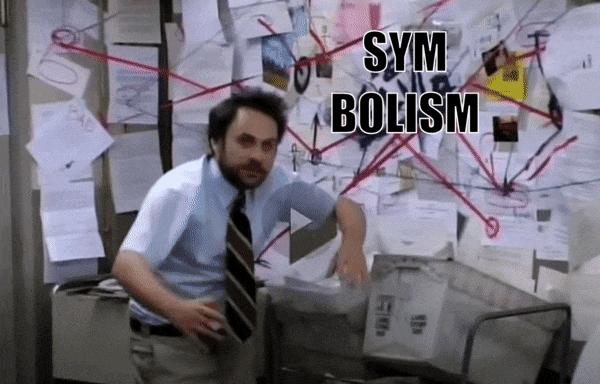
Massive wall of text incoming b/c I can't stop rambling once you start me up on Genshin lore.
The theories:
Fontaine fucks up and Celestia gets involved
My big pet theory that I've been nursing for over a year now, ever since we started hearing from bit NPCs in minor events about Fontaine's energy problems, is that I think Celestia is either going to drop a nail on Fontaine or at the very least finally become relevant to the main plot in a big way by sending someone to intervene with Fontaine's technology and the mockery Focalors is making of the judicial process. (They might not care enough to intervene in the average judicial process, but she's literally the capital-letters God of Justice, and it's supposed to be her ideal. If she's abandoned it, they might not be happy.) They're also hovering over what we can assume to be the location of Fontaine, which is not a good sign.
This theory was strengthened when reading Rene's Investigation Notes in the Khvarena of Good and Evil questline, which indicate that Fontaine has done research on Khaenri'ah's use of abyssal power as an energy source, which was warned against by some of Khaenri'ah's own people but ignored (to disastrous outcome). There are a lot of parallels being set up between Khaenri'ah and Fontaine in those notes and with all the mention of sinners in the Final Feast trailer narration, and I'm not sure they bode well for Fontaine.
It's possible that the energy generator machine that Persikov and the other Fatui were working on as far back as 2.8's Golden Apple Archipelago were meant to help them gain a foothold in Fontaine; after all, solve the desperate nation's energy problems, and you suddenly hold a lot of power in the nation and can even hold their energy source ransom until your demands are met. I wouldn't be surprised if "the Fatui control Fontaine's energy future and use it as leverage" is a plot point.
(Although back in the day I thought it would be Pantalone behind that plot, not Arlecchino, because economic and political manipulation seemed his style and we hadn't heard anything much about Arlecchino yet. Hell, Arlecchino had been mentioned like once in-game then, in Inazuma's "The Very Special Fortune Slip" hidden questline, and was still referred to as male at that point.)
2. Neuvillette is unjustly imprisoned by Furina; Charlotte figures it out
I think Neuvillette is going to be imprisoned by Furina (who's pretty obviously the hydro archon Focalors), foreshadowed by the bars going over his face but not Clorinde's when they're walking in the sewers in the trailer. This will likely be either Furina framing him for something (foreshadowed by her burning what seems to be evidence while complaining about the lack of plot twists and entertainment, while he's literally 'framed' by the burning photo) OR a political imprisonment because they have an ideological clash.
Neuvillette seems to actually want justice, Furina seems to want a show. She seems very pouty and childish; if he tries to discipline her or remind her of the true meaning of justice, she could very well order him arrested and turn it into a grand trial to feed her lust for entertainment. And it could certainly be a combination framing/political imprisonment as well. Very French Reign of Terror style.
Charlotte may figure this whole situation out; in the trailer she's investigating photos with a puzzled look on her face as if she sees something wrong with them, and in the TCG event she offered to let us take out an ad in the paper if we ever needed it, in exchange for our assistance during the event. Now, the pictures were of Navia, not Neuvillette, so this may be an unrelated plot, but surely she's going to help us sleuth up the truth of something with foreshadowing like that.
Neuvillette is also...something. His eyes resemble Khaenri'ahn eyes, he's got the Kleelike pointy ears, and his cool blue hair streaks are certainly interesting. Oceanids can mimic other creatures so he could be an Oceanid (and given that they were spies of the previous archon that would set him up nicely for opposition to Furina). He could be Klee's species. He could be a Khaenri'ahn.
Whatever he is, he's NOT standard modern Teyvat human, and he's NOT the previous hydro archon despite the hair streaks because we know from the Khvarena of Good and Evil questline and Vourukasha's Glow artifact set that the previous archon died and was anchored beneath the Harvisptokm in the form of the giant Gaokerena lotus to purify abyssal influence in the region.
Neuvillette, I've got my eye on you. (Both eyes. While twirling my hair and kicking my feet.)
1b+2b. Neuvillette replaces Furina as hydro archon
I fully understand this is an unlikely scenario so it's not as firmly a prediction as much as a "this would be interesting," but if Celestia brings judgment on Fontaine it is possible that the hydro archon slot opens up, either because they repossess Furina's gnosis and find a new archon, or because they straight-up kill her (can you fucking imagine the shock from the community if they kill an archon off? but they'd still get to sell two separate units as archons, it'd be a win/win for them).
If this happens the logical choice for a replacement would be Chief Justice Neuvillette, especially if he was in opposition to the behavior that put her on Celestia's shitlist. I can see it now: Celestia repossesses the gnosis, gives it to him, he says thank you, the Celestians fuck off to be mysterious again, and he turns right around and hands it to the Fatui in exchange for getting the hell out of Fontaine. (Or for some other reason.)
I highly doubt they'll go this route, but I would love to see it. Not only would it even out the archon gender ratio a bit, but it would answer the question of how a change of archonhood takes place, which we still haven't seen since Morax hasn't been replaced as geo archon yet. And I think it's a question we deserve to have answered before the end of the game. If not here, then perhaps in Natlan (see point 7 below).
3. Lyney, Lynette, Freminet, and Arlecchino
This is a pretty common/obvious theory but I agree that the siblings are all likely working for Arlecchino, likely unwillingly. She runs the House of the Hearth which takes in (and sometimes causes) orphans and trains them for the Fatui; we've seen several NPCs that came from them before and many of them consider each other brothers and sisters.
I don't think Lyney and Lynette are related to Freminet by blood; I think they consider him a sibling due to being raised together. The resemblance between Lyney and Lynette is clearer, especially with the twin names, but names can be changed, so I don't even treat it as confirmed that those two are blood related until proven otherwise, especially since Lynette has cat features and Lyney doesn't.
Both Lynette and Freminet seem to have robotic features, and we know that Fontaine has robots and Snezhnaya has the technology for segments, plus we've seen Albedo as a homunculus and Scara as a puppet, so artificial humans are very much within the realm of possibility for Teyvat. Lynette is said to have rather mechanical behavior, and Freminet's constellation is literally 'Automaton.' So I think it's likely enough that one or both of them aren't flesh and blood humans.
To take that a step further, I think it's possible that Lynette died at some point, and the current Lynette is a mechanical replacement OR a robotic body being inhabited by her soul (Alphonse from Full Metal Alchemist style). Lyney may have had to pledge loyalty to Arlecchino and the Fatui in order to rescue or recreate his sister through these means, OR it's possible they were already in the House of the Hearth and Dottore or somebody else damaged the original Lynette while experimenting with her.
Dark. And quite the fun twist if it's true, tbh.
4. Navia and Clorinde
Navia gives off a 'gentleman thief' vibe to me but lady version, and Clorinde shoots directly at her in the trailer, indicating she's playing the role of the detective or law enforcement officer tracking her down. I don't have coherent thoughts here on a lore front really, I'm just really excited for the possibility of gentlewoman thief rivals to lovers/enemies with benefits lesbians.
Clorinde's outfit looks a bit historical Navy inspired to me, so maybe she's a member of the Navy, but I'm not really sure why she'd be chasing criminals if that's the case.
5. Wriothesley, Sigewinne, and the Tower of London
I don't have a solid opinion on whether Wriothesley is blind or not as possibly hinted at by his fumbling for the cup, but I think it'd be cool if he was! People point to him looking at papers or at Sigewinne as evidence that he's not, but 'blind' as a term does not always mean complete lack of sight, for one, and if we assume he's a vision user as a seemingly playable character then there could be alternative methods he reads things with, such as using elemental sight to read ink with crushed-up elemental rocks in it or something.
He seems rather military, and Fontaine seems to have a strong military presence in general with some of the Melusine giving off a British bobby (police) vibe visually. I wouldn't be surprised if we get a structure reminiscent of the Tower of London, potentially where Wriothesley works and Neuvillette gets held when imprisoned.
No solid thoughts about Sigewinne yet other than I'm guessing she's going to be a healer or support, since she's little and cute and taking care of someone in the trailer. I assume she's a Melusine.
6. Chenyu Vale and Qiaoying Village (and Yilong Port?)
They're coming. I can feel it in my bones that at last we will go to the long-awaited Baizhu homeland. Why? There have been multiple sources indicating that they're placed between Liyue and Fontaine, likely between Fontaine and Qingce Village. I think 4.4 should be Lantern Rite judging from the usual calendar, and that would be a prime time for it to pop up - the main Fontaine story should be over at that point, and we'll be back in Liyue anyways. It will also be the Year of the Dragon, which might mean time for some juicy Zhongli or Liyue lore. Though they might move Chenyu Vale elsewhere in the 4.x schedule if needed.
This region will likely utilize Fontaine's diving mechanics. Legends about the region in weapon and artifact lore discuss powerful sunken jade artifacts in the rivers and lakes of the region, which would make a storyline revolving around finding them the perfect excuse to introduce the diving mechanics to a non-Fontaine region. Given the name and the lore, it's very possible that Baizhu's signature weapon Jadefall's Splendor is one of those pieces of jade, reclaimed.
For that and multiple other reasons, I believe Baizhu will be relevant to the main storyline here. Not only does he have a personal vested interest in finding interesting and powerful old artifacts or knowledge that might aid in his search for immortality, but Changsheng is intimately connected to the region lorewise. The Echoes of an Offering artifact set doesn't mention Changsheng by name, but it does discuss an adeptus named "Herblord" in Chenyu Vale and tell her story, and Changsheng is referred to as an "Herblord" in Baizhu's story cutscene. There's no reason to refer to them both with such a specific unusual term unless they're one and the same.
(I also have a theory that the other woman in the artifact lore is Madame Ping. The other woman is referred to as a fish adeptus, and Madame Ping's younger self in cutscenes has fish motifs and a fishtail silhouette, so I believe she's likely a koi as her adeptus form. I am highly tempted to write a Changsheng/Madame Ping fic because y'all there is something incredibly wlw happening in that artifact lore. I am also not going to be surprised if Madame Ping's younger form becomes playable in conjunction with Chenyu Vale story.)
7. Natlan
As a final far future prediction: In Natlan, Capitano will likely challenge the pyro archon for her gnosis and possibly even replace her. We know he's headed to Natlan and also "has the courage to challenge gods as an ordinary mortal" from Varka's Weinlesefest letter, and if Pierro is simply the "Director" of the Fatui as labeled in the Winter Night's Lazzo description and not a numbered harbinger, Capitano may occupy slot #1, which would be in line with his name as the Captain. We've been told by Nahida that the top three harbingers rival gods in terms of power, and I feel like if any god would answer a martial challenge with their gnosis on the line it would be the God of War, especially if the challenger was backed by another archon. I TRULY hope we see a fight between them.
(I also wanna see someone guillotined in Fontaine to fit the vibe but I highly doubt that will happen in Genshin. I think Signora was the most violent death we'll get onscreen.)
Anyways I hope someone found this titillating or educational and we can all look back at this and laugh at how wrong I was a year from now, but occasionally my farfetched theories do work out, such as when I looked a the Echoes of an Offering set lore on its release a full YEAR before Baizhu's release and excitedly vibrated to a friend about how it HAD to be related to him or Changsheng.
(I have theories past this point in the game too but they mostly rely on esoteric Gnostic text parallels more than in-game foreshadowing/content so I'm less confident in them.)
#aewinblabs#genshin impact#fontaine#theories#fontaine predictions#predictions#spoilers#genshin spoilers#maybe#if you're not up to date on quests and obscure lore at least#but everything mentioned here has been out for at least a patch now#except for the fontaine trailer
7 notes
·
View notes
Text
Mapping the abyss twins journey Part 1
Someone tries to preform a summoning and "The heavens respond" (Traveler may have landed with them unconscious) - Inversion of Genisis
Abyss Twin "suddenly appears in Kheanri'ah" they stay with Pierro for some time -The Kalpa Flames Rises & Inversion of Genisis
BLANK PERIOD
The cataclysm occurs.
Abyss twin finds traveler and awakens them, tells them the fall of Kheanri'ah plunged the world into chaos and that they need to leave Teyvat - Well Will be Reunited
The events of Genshin Impact's opening scene occur, the twins are separated by The Sustainer of heavenly principles
BLANK PERIOD **
Abyss Twin encounters Dainsleif they leave after the cataclysm starts to cease -Khvarena of Good and Evil
They travel together to "search for their fate" - Requiem of the Echoing Depths
BLANK PERIOD **
Abyss Twin encounters Chlothar Alberich and attempt to help him with his son Caribert while Dain is in the forest - Caribert
Discovers "The Sinner" alongside Chlothar after mistaking a hilichurl for Caribert- Caribert
Continues to help Chlothar even after Caribert shows some improvement in regaining his ability to communicate like a human -Caribert
Caribert takes off his mask and attempts to run away in despair at his appearance and form -Caribert
Chlothar and Abyss Twin try to convince Caribert to return with them -Caribert
Caribert takes off his mask and a dark power engulf Abyss twin and Chlothar -Caribert
Abyss Twin awakens to Chlothar suddenly claiming they know who they really are, learns about "The Loom of Fate" for the first time- Caribert
BLANK
Continues to travel with Dain, at some point they go their separate ways -Requiem of the Echoing Depths
Joins the Abyss Order eventually being their "Prince/Princess" -Carbert
**(UNSORTED) Abyss Twin helps the Aranara cleanse the land of the defilement of the cataclysm, leaves a message in the book about "saying too much", wanting "to be remembered as a Nara Friend" but that "one day things will eventually..." something "escaping" and having "many thing to say" to their twin, hoping things can "still be salvaged then". There is no mention of Dain at any point and time during these events- Aranyaka
5 notes
·
View notes
Text

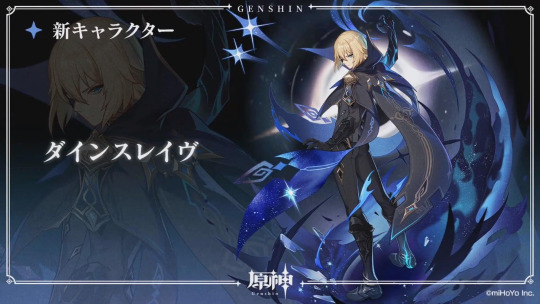
Day #893 of brainrotting about the way an humongous event horizon stands behind Dain pretty resemblant to a leaked abyssal enemy, except on the latter it's on a significantly smaller proportion tucked in its chest, the flames of galaxy at his fingertips and his feet and the shards of crystals stand there as more than plausible burst—
#◟༺✦༻◞ what lays behind the mantle of faux stars ┊ooc.┊#character designer: how many astronomical elements do you want to apply to him?#H.YV: yes#I hope that the next AQ he appears will be better#in terms of his own involvement#than Caribert was#I'm also crossing my fingers that that abyssal enemy#is related to him somehow#or added when his quest/patch are released#like it happened with the hydro and cryo abyss heralds#and the black serpent knights#he also had a cameo in the Khvarena of Good and Evil quest#whose exploration led us to the Iniquitous Baptist too#come on H.YV#you have it there 😔#I adore how even something like this#can apply to his indisputable connection to Irminsul#as even Irminsul is littered with stars#as well as the resin flowing within Ley Lines#also for those wondering#the number of days is no joke#it's the time I've been writing this man here djfhjg
2 notes
·
View notes
Text
[4.1] What is "It"?: Theories on Will, Wishes, and Fate
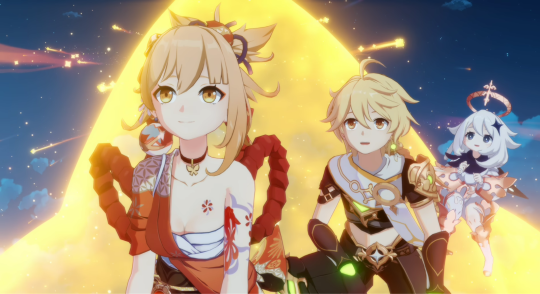
With the finale of Fontaine’s Archon Quest in just a few days, I know there’s a lot of questions I’m personally anticipating the answers to: what is the true origin of the prophecy? What is the Primordial Sea, really? What is the connection between it and the Abyssal whale? And just what exactly did Skirk mean when she said that Childe had awakened “it” and had traces of “it” on him?
Most community theories suggest that “it” just refers to the whale, but like, what is the whale? Why did Childe even see it in the Abyss all those years ago, and why has it reappeared now? Well, I have a few ideas I’d like to explore about that, albeit in a very roundabout way, and they start with a quest that I feel has been severely under-discussed and under-theorized since its release: Yoimiya’s second story quest.
It’s understandable that this quest didn’t get too much buzz between its very unfortunate timing in patch 3.7, when community burnout was exceptionally high, and Honkai Star Rail’s debut as the Shiny New Thing. But it’s also a shame, because this story quest is full of interesting lore, Freudian references, and a few intriguing world building mysteries beneath its very wholesome story and further exploration of Yoimiya’s character. That is to say, the content of Yoimiya’s second story quest really matters. It’s not just because it is the first non-Archon character’s second story quest to date — it’s because it is an incredibly important piece of the puzzle comprised of Nahida’s second story quest, Caribert, and Khvarena of Good and Evil that was preparing us for Fontaine’s plot.
This is an attempt to identify and analyze the connections between Yoimiya’s second story quest and those above, as well as to theorize about the greatest mystery in Yoimiya’s quest, the “Urstone,” and finally tie all of that into Fontaine’s Archon Quest thus far. As that is an ambitious project, this will be far from an exhaustive theory, but I hope to at least get closer to understanding the meaning behind Childe awakening ”it.”
SPOILERS: Fontaine AQ Acts I-IV, Yoimiya’s SQ Act II: Star-Pickers’ Passage, Aranyaka, Nahida’s SQ Act II: Homecoming, Khvarena of Good and Evil, Ei’s SQ Act II: Transient Dreams, Kazuha’s SQ: A Long and Friendless Road (very minor), and Caribert.
A “Story”
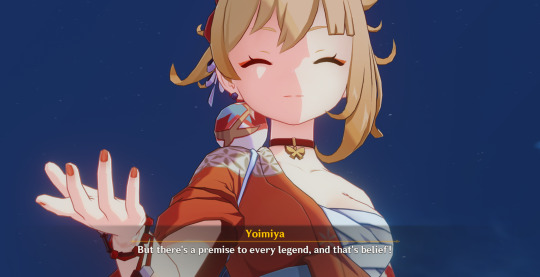
Yoimiya: But there’s a premise to every legend, and that’s belief!
Since it's been a while, let’s start with some recap of Yoimiya’s Act II: Star-Pickers’ Passage.
By chance, the Traveler comes across Yoimiya in Inazuma as she prepares to search for a great meteor shower like the one that her ancestor saw many years ago. It’s patch 3.7, so the Traveler’s got a lot of time to kill and offers to go with her from Ritou to Port Ormos. There, they come across Acara Crafts’ stall that sells Aranara carved figures, which Yoimiya buys out to bring back as souvenirs to Hanamizaka.
In Sumeru City, Yoimiya and the Traveler briefly split up to look for meteor shower leads, and the Traveler runs into Nahida at the Akademiya. Upon learning their journey’s purpose, Nahida explains that meteor showers are unpredictable occurrences related to “intricate fates” interfering with one another, and for this reason seeking one out reliably is impossible.
The Traveler and Paimon are reluctant to tell Yoimiya this out of fear of disappointing her and rendering her journey meaningless, so with Nahida’s help they decide to facilitate the meteor shower through a dream in order to fulfill her wish.
This is the first of many references to psychoanalysis and Sigmund Freud’s theory of dream interpretation in this quest. Freud thought that the psychological purpose of dreams is to fulfill wishes, particularly wishes that we’ve forgotten through repression. He believed that these unfulfilled wishes are what produce the dream itself; the wish “wants” to be remembered, and the mental processes that repress it are weakest at night, so dreams are our mind’s attempt to translate the underlying “thought” that represents the wish into “images” while we sleep. Through dreams, unfulfilled wishes can be made conscious or remembered and fulfilled through a fantasy.
To lure Yoimiya into the dream and sell her their “story”, the Traveler and Paimon craft the perfect pretext so that she fully believes that they are preparing to see a meteor shower. Their pretext’s foundation, namely the idea that meteor showers are summoned by people’s wishes, subtly twists the truth in Nahida’s words so that something intangible and uncontrollable is framed as something with an amount of certainty. In other words, by controlling the pretext, the Traveler and Paimon are able to control “truth.”
Upon reuniting with Yoimiya, the Traveler finds her with a little girl in a wheelchair named Avin. Before parting ways, Yoimiya gives her a carved Aranara souvenir to thank her for guiding her through Sumeru City, and to cheer her up. Yoimiya then tells the Traveler that Avin has an unknown chronic illness that immobilizes her legs, and that she had approached Avin because she seemed to be alone and in a bad mood.
As they refocus on finding the meteor shower, the Traveler and Paimon begin to tell Yoimiya their lie and set the plan in motion. They play the role of magicians using careful misdirection to craft a wonderful illusion; beneath the ruse of finding the right “location” (or “space”) and forging a special device (which can be anything) to observe the meteor shower, they will take Yoimiya on a journey through Sumeru and make memories with her, adding meaning to what is ultimately a trick. With these seeds planted, they head off to Devantaka Mountain to “practice” wishing for the meteor shower.
At the top of the Ruin Golem there, Yoimiya shares more about her motivations for setting out on this journey. As someone who was entrusted with the wishes of everyone in Inazuma who heard of her dream, Yoimiya began to wonder why people derive this meaning from meteor showers in the first place:
Yoimiya: People use fireworks to remember their most precious memories, and these memories sparkle and shine each time the fireworks fly.
Yoimiya: In other words, fireworks symbolize the past.
Yoimiya: And shooting stars make people think of wishes because wishes carry people's brilliant hopes and expectations for the future.
Yoimiya: One represents the past, and the other the future. They both bloom in the sky, but have completely different meanings behind them.
Yoimiya’s belief that wishes are beautiful things that join the past and the future is what gives her journey meaning, and this is what keeps her moving forward despite the lack of certainty that she will ever find this beauty herself. This admiration for the hope in people’s hearts is what shapes her wish, too.
After returning to Sumeru City, they ask Ahangar for guidance on how to forge an observation device with the purest ore. After some initial skepticism, he chooses to entertain their “story” and tells them about his own profession’s local legend: somewhere, there exists an excellent forging material that few have ever found, and the few who already have it have never used:
Yoimiya: So you mean that [the forging material] symbolizes dreams?
Ahangar: Dreams, inspiration, obsession, focus…. Call it what you want. But if you take it to symbolize “purity,” then I believe it is your goal as well.
Ahangar: We call it Urstone, but in truth, neither I nor my colleagues have ever seen it.
As they are about to set off and find this Urstone, Avin’s parents show up looking for her after she didn’t return home that day. The Traveler and Yoimiya then find Avin collapsed on the outskirts of Sumeru City. After calming her down, Avin discloses that her illness has not just immobilized her – she has also forgotten her happy memories and how it felt to be passionate before she got sick. With no end in sight to her illness, Avin’s dreams of becoming an adventurer have ended and her world feels as if it is closing in on her – as she later reflects, her world had “shrunk down to a tiny space.” Avin’s illness is an objective truth with material consequences on her life, and this truth ended the fantasy of her innocence, along with her dream of becoming an adventurer one day. This loss of innocence, and therefore loss of childhood, triggered feelings of depression and hopelessness in her. However, the Aranara carving that Yoimiya gave Avin reminded her of her childhood friend, Arashani, who she desperately wanted to see again.
To help Arashani and Avin reunite, the Traveler calls on the Aranara for help with a whistle that Nahida gave them for the dream-meteor shower. When Arapurva arrives, Yoimiya asserts herself as someone who both values childhood innocence and sees children’s dreams as worthy of protection, which earns the Aranara’s trust:
Arapurva: It seems that Red Nara has not yet grown up.
Paimon: Huh? What do you mean by that?
Arapurva: Time is very important to Nara. Nara walk with time. They remember much, and they forget much. But Red Nara is different. You know how young Nara think. The warmth in your heart is very pure, and it is fierce like the sun.
Arapurva then takes them all to Mawtiyima to find Arashani, and here they enter a collective dream. Before leaving them, Arapurva urges Avin to remember, and that to do so she needs both memories and dreams. Arapurva also says something very interesting, also worth keeping in the back of your head: “Dreams are connected to your heart, not your body.”
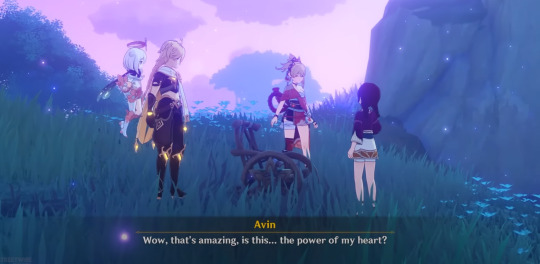
Avin: Wow, that’s amazing, is this…the power of my heart?
Video Still from Streetwise Rhapsody
The dream space allows Avin to unite thoughts with belief to create images. Remember, according to Freud, the psychological purpose of dreams is to make conscious an unfulfilled wish – so, in this liminal space between the conscious and unconscious, Avin can create the image of herself walking again just by thinking of it, because it is her wish, and thereby remember how she once felt before she got sick.
As they search for Avin’s memories of Arashani, Yoimiya and Avin chase a wayward “star” across Mawtiyima’s mushroom canopy until they reach an iridescent pale blue stone with a solid partial casing surrounding it. Inside, the stone glitters with the light of the universe.
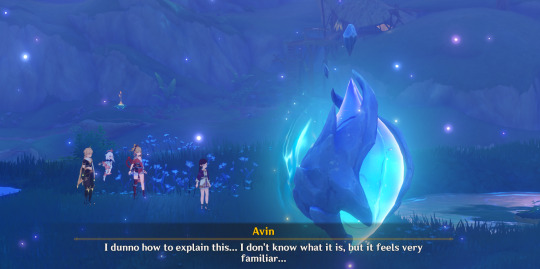
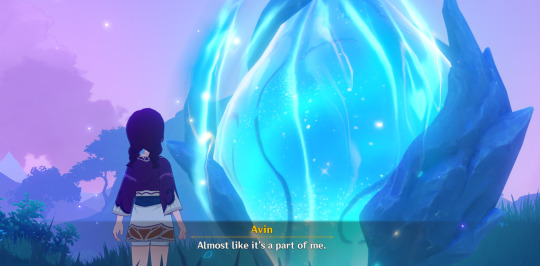
Avin: I dunno how to explain this…I don’t know what it is, but it feels very familiar…Almost like it’s a part of me.
Yoimiya speculates that this stone is what Avin has been searching for all this time, and that it is her Urstone:
Yoimiya: It's a very rare ore that symbolizes a person's aspirations and dreams.
Yoimiya: Since you can see it, that means you've found what you've lost.
Avin: Is that how it works...?
Avin: It's just like in fairy tales... I thought I'd stopped believing in those.
Avin: But I'm glad that I found that belief again.
Avin then reaches into the Urstone and passes through it into a deeper layer of the dream, and there she reunites with Arashani, signaling that she has regained her memories. Having found him again, Avin’s hope is renewed and it changes her reality – indeed, it changes her fate. To be clear, Avin can’t dream or wish away her illness in real life, but her hope is what allows her to expand the “tiny space” her world had become in her depression.
After this, the crew seemingly returns to reality, but finds that Arashani is still there along with Arapurva. Having settled her worries, Avin resolves to help Yoimiya and the Traveler achieve their wish to see the meteor shower, and offers them her Urstone…
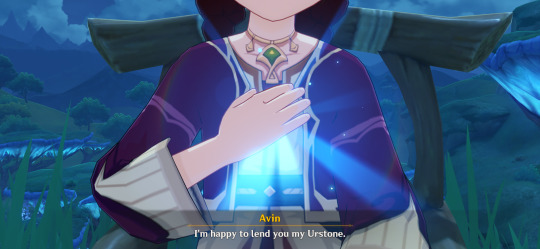
Avin: Yoimiya, you need this Urstone because you want to see a meteor shower?
Yoimiya: Yep. Oh! Once we find it, you should come with us!
Avin: If that’s how things are…I’m happy to lend you my Urstone.
…And then, Avin pulls a light blue lens from her chest, right over her heart. With this lens crafted using the purest ore, they locate a meteor shower of stars flying up from the ground and ride them through the clouds. Finally, they wake up from the collective dream and part ways in Port Ormos.
The Purest Ore and the Will to Power
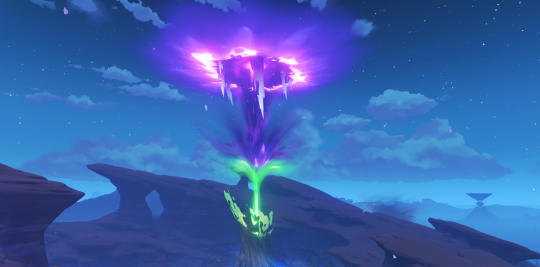
Now, there’s a lot to discuss about Yoimiya’s second story quest, and we will get to as much of it as possible, but the bulk of this theory will be focused on trying to understand the Urstone, so that is where we will begin.
Let’s start with what we know from the quest. We are told three things about the Urstone: it is “the purest ore,” it symbolizes dreams, and through the dream we are implicitly told that it represents the power of the heart.
This last area is where we’ll turn the majority of our attention, because from there we can reach a greater understanding of many worldbuilding concepts we’ve encountered in the story thus far. However, all of these definitions of the Urstone work hand-in-hand and do not contradict one another, so they are all helpful to keep in mind going forward.
But what do I mean by “power of the heart?” Well, first let’s harken back to the Aranara quest, Aranyaka, where we learned about the “Sourcesong” and the songs that split off from it through time. By learning all of the songs that represent these branches from the origin, the Aranara get closer to learning the Sourcesong:
Arasudraka: Songs are like rivers. They derive from the same origin, the "Sourcesong." She is the home to all songs and the source of all great rivers.
Arasudraka: Then, it changes when it is sung for different memories and different stories, just like how a great river diverges into creeks.
Arasudraka: Just like all the creeks eventually flow into the sea, all the songs eventually converge into one, into the Sourcesong.
Arasudraka: So Aranara song gatherers have to find all the songs. That way, we can find the Sourcesong.
These songs serve as a metaphor for another theme of Aranyaka, which is the concept of “returning to Sarva,” or returning to Irminsul after death in the form of memories/energy in the Ley Lines. It could also be extended to what we currently understand about the Primordial Sea as the origin of all life, its “source,” and all the lifeforms that arise from it are like the creeks that diverge from the river before they eventually converge back into the sea:
Paimon: What? You mean you don't believe in the prophecy?
Augereau: No, no, I believe in the prophecy, but I also believe in another story.
Augereau: The story says that people once lived in the ocean. They were one with the ocean and couldn't live apart from it.
Augereau: But as time wore on, people desired to live on land and developed blood vessels, encapsulating the sea within their bodies. Thus could people set foot on land.
Augereau: So if you ask me, when the water rises and takes us all, it'll be like we're going home.
The philosopher Friedrich Nietzsche was also interested in the idea of things differentiating themselves from a primordial source of sorts, and he uses this language in one of his many attempts to define his most well-known philosophical doctrines, the Will to Power. In Beyond Good and Evil, Nietzsche marks the inner “world of desires and impulses” as the source of emotions (Nietzsche, 35). He likens it to a primitive world where desires exist in a state of unity that then branch off into distinct organic processes. Nietzsche argues that this differentiation arises due to “will,” and that will is the “causality of all things,” and that all will is Will to Power – in other words, the will to dominate and to multiply (Nietzsche 13 & 35).
“Will” is the force that differentiates the primordial soup of our base desires and impulses into distinct organic processes, and these processes then give rise to distinct life forms that separate themselves from the original state of unity. That is, without “will,” we would all still be floating in the unified state of the primordial soup - will is both the cause, and the reason for individuality:
Mary-Ann: Water can take any shape, and life can choose what form it must take. This, however, has nothing to do with its essence. That is a different matter.
If you’ve been following the Narzissenkreuz Institute world quest plot, this discussion of “will'' should be ringing some bells. In Khvarena of Good and Evil, we came across Rene’s Investigation Notes in the Girdle of Sands, which talked about the power of Khvarena and a blurred out word (likely “Abyss'' or “Void”) containing a will of their own that can recognize itself, unlike the power of the Elements:
...Though the results are nothing impressive, this is because the object [the Khaenri’ahns] chose was pure elemental force, which lacks any will whatsoever. Like the difference between the Director and a Hydro Slime, perhaps?
[…]
Even though the calculated result is unchanged, but if the refinement method is reflected... If the power of... then maybe we can extract the "will" within. Using this method... resist the impact…
The investigation notes do two things here that we’re interested in: first, they establish the presence of “will” as the distinction between elemental energy, such as that found in Azosite, and the higher powers represented by Khvarena and “Void,” and second, they raise the possibility that “will” is something that can be removed from its vessel, so to speak, or perhaps manipulated. Just keep this in the back of your mind for now, too, we’ll come back to it much later.
If we apply this concept of will back to the Sourcesong story, then it is will that differentiates each song into its own unique form, but each song still contains the essence of the Sourcesong from which it arose. A similar story is told about the five branches of the Raiden Gokaden. In Kazuha’s Story Quest, Amenoma Tougo likens the Raiden Gokaden to schools of thought that originate from a single source, with each branch carrying its own philosophy. Kazuha’s family’s school, the Isshin Art, seeks “complete harmony between blade and mind” during the forging process, because they believed this was the only way for a blade to “capture and convey its maker's thoughts and feelings, and eventually become an extension of its wielder's will.”
This is a very important concept as we move forward. If we think of will as what differentiates each forging art of the Raiden Gokaden from each other and their source, and each branch is considered a unique school of thought and philosophy of blade forging, then thoughts are an essential component of will. If a blade that these philosophies produce is meant to capture the thoughts and feelings of its respective forging branch, such that they are an extension of will, then will can be further defined as the cause and reason that an abstract form (thoughts and feelings) is translated into a physical form (an object, such as a blade). It is both the how and the why.
Put another way, the blade is the bladesmith’s will embodied. It is the bladesmith’s thoughts and feelings, which we have just established are an essential component of will, given a physical form. The thoughts and feelings are will, the object is will, and the “force” that translates the abstract into the physical is will. So basically, it’s all will, but in different forms.
But so what? Well, let’s go back to the amazing feat that Avin accomplished towards the end of the story quest. She asks Yoimiya what she needs, then says she will lend her Urstone to Yoimiya to help her achieve her dreams, and what does she then do? She pulls a viewing lens from her chest, right over her heart.
That is what the Urstone is. The Urstone is the source of a person’s will, and the Urstone is associated with the power of the heart, which would also make “will” the power of the heart. Will is what underlies the power of creation and imagination, or as Ashikai puts it in her theory of Irminsul’s true purpose, the power by which “thoughts become things.”
The purest ore was needed to craft the observation device, and of course the purest ore would come from the purest will – a child’s will. What’s more, Yoimiya and the Traveler never even mentioned what kind of device they needed to forge with the Urstone. It was Avin’s will to help her friends that materialized their thoughts into an object. The implications of this are fascinating, though this theory isn’t going to go there. Instead, I’d recommend watching Ashikai’s video above if you’re interested in that train of thought.
The Seed of Ideas*
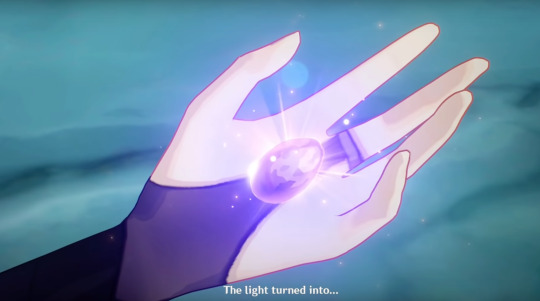
Paimon: The light turned into…a seed?
Having established this connection between thoughts/feelings, the power of the heart, and “will,” let’s see how else we can think about the Urstone. I noticed that “will” turns up in a couple of other recent to semi-recent contexts, and both of them involve the origin of some important trees in the open world.
To start, let’s revisit Ei’s second story quest. As a lightning fast refresher, Ei and the Traveler were investigating Rifthound activity near the roots of the Sacred Sakura tree, which we know protects Inazuma by purifying “filth” from the earth, or rather the memories of people who died on the land. This is meant to mirror Irminsul, since the Ley Lines also contain memories and are Irminsul’s root system. With the Sacred Sakura’s roots damaged, this “filth” leaks out, and the memories within are briefly re-projected onto the land.
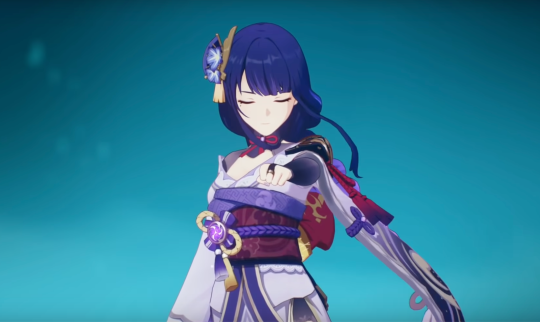
As Ei confronts her past through these memories of Inazuma, she vocalizes her change of heart since the Vision Hunt Decree and her newfound will. The Shogun then challenges her to a duel in Raiden Makoto’s realm of consciousness, which Ei preserved before she passed away 500 years ago. When Ei successfully proves the strength of her will to the Shogun, she awakens another fragment of Makoto that she hid inside Musou Isshin. Interestingly, Makoto calls this a fragment of her will. Upon awakening her will, it becomes a seed that Ei plants in the realm of consciousness, which grows the Sacred Sakura tree in the real world. In other words, the Sacred Sakura tree is Makoto’s will given a physical form, another example of someone’s will embodied.
But this is not even the first time that will has been represented to players as a seed. In Dragonspine, the Frostbearing Tree goes through a physical transformation as the Traveler offers it more and more Crimson Agate, which is a crystal tainted with Durin’s abyssal blood. After offering enough Crimson Agate, we get the blueprint for the Frostbearer catalyst, which tells us an interesting story:
A long, long time later, yet still long ago —
When the deathmatch between the dragons of darkness and wind was decided at last,
When corrosive blood stained the ashen valley red,
The tree, at last, remembered that it had not died with that entombed city,
And it extended its greedy roots towards the warm ichor that irrigated the land.
Because a certain someone poured out a crimson essence upon it,
The tree that should have long died remembered its past,
And bore a single fruit from the coalescence of all its might…
As creepy as the Frostbearer catalyst lore is, there’s another useful analogy to be made here so that we can better understand Avin and her Urstone.
Think of Avin as the Frostbearing Tree, a tree that “should have died” but remembered its past upon being offered Durin’s blood. This may seem like a strange comparison at first, but Durin’s blood is conceptually not so different from the memories flowing in the Ley Lines like water, or the filth flowing through the roots of the Sacred Sakura tree, just as Durin’s “heart” is likely a similar anchor for his consciousness as Elynas’s is, just as Makoto’s fragment of her will became the seed or “source” of the Sacred Sakura, or the “Urstone,” we theorize, is the source of an individual’s will.
Basically, Durin’s blood is a liquid form of his will that can change the “shape'' of the objects it comes into contact with, and upon being exposed to it the Frostbearing Tree remembers what its life was like before the Skyfrost Nail dropped on Sal Vindagnyr. This is very similar to how Avin remembered her happiness before her illness through the magic of the dream space and finding her Urstone. And upon remembering its past, the Frostbearing Tree bears the “fruit” that is the Frostbearer catalyst, the “coalescence of all its might,” but Avin bore the observation lens. Both are products of their source’s will, but have different emotions behind them due to their difference in purity.
But there’s one last thing I want to point out about the Frostbearer catalyst before moving on to the next point. A fruit is like a sugary case for a plant’s seeds, so what might this structure be in the center of the Frostbearer catalyst?
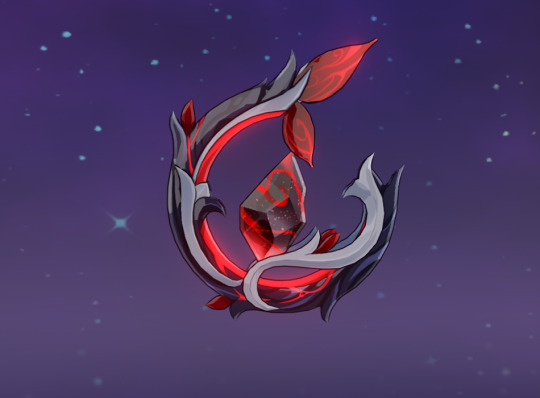
That’s right. A “seed,” which also resembles a gem or a stone. And not too unlike the general shape of the Urstone, I would add.
But you know what else the Frostbearer catalyst and the Urstone really remind me of? The Fire Seed from Nahida’s second story quest. Although the Fire Seed neither becomes a tree nor seems to come from one (though this is also debatable if you consider Rukkhadevata and Nahida to be like…smaller trees, originating from Irminsul), it’s still worth talking about if only for a potential analogy between it and the Urstone.
The Fire Seed has obvious visual similarities with the Frostbearer catalyst, with both “stones” or seeds in the center of them having the same overall shape - the Traveler and Nahida even call the Fire Seed a crystal before they learn what it is from the elemental life form in the Chasm.
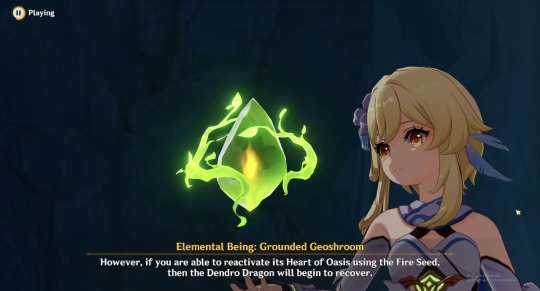
Video still from Star Dragon X
The Urstone also generally looks similar to the Fire Seed in terms of the stone’s shape and the orientation of the casing-like objects around it, but there’s a more compelling analogy to be drawn between their composition. The Fire Seed is described as an extremely high concentration of elemental energy in a very fragile or unstable state, and we know from our understanding of Irminsul that elemental energy is another form that memories can take. While it’s not clear if passing through the Urstone is the same thing as entering the Urstone itself, Avin does access more of her repressed memories of Arashani after doing so, allowing her to “remember,” as Arapurva asked her to. So, both seem to contain memories.
You may also know that the prefix Ur- in Urstone means primordial or original, something from before the present. This leads me to wonder if that light of the universe glowing from within the Urstone is what Roozevelt calls “primal energy.” Hoyoverse does like to worldbuild through analogies and allegories, so I wouldn’t be surprised if the visual similarities between the Fire Seed and Urstone were meant to be a tip for a functional similarity as well.
Finally, there’s the relationship between the Fire Seed and Apep’s Heart of Oasis. The Fire Seed was made by Greater Lord Rukkhadevata with the help of Apep’s “children,” the elemental beings that split off from that “source.” It is meant to mimic the Heart of Oasis and the way that it functions, which tells me that all of this will/”heart”/source as a seed imagery is being repeated for a reason, because it’s meant to teach us more about how “will” works.
Remember how the Aranara believe they can find the Sourcesong by learning every song, and how this points to the idea that the essence of the source is retained in each of its “children,” despite the unique form that each song takes? Well, let’s think about that for a second. For example, think about how light shining through a prism will split off into unique colors - each color is distinct from the other, with a unique character and “form,” so to speak, but each color still originates from light. Red, green, and blue may all look different from each other, but each tells you about a characteristic of this thing called light.
I think the same is true about these “seeds.” These fragments of an original consciousness can take the form of seeds because that is one facet of the essence of the source. That’s why an Urstone can be so many things at once: a “heart” (though not corporeal), an “ore,” a source, a will, and a seed. That is because each fragment of the source’s will conveys a small “idea” taken from the original consciousness, and these ideas are like fruits born from a tree. If you were to “plant” these seeds in the ground, the ideas would spread across the land, thereby allowing one’s will not just to dominate, but also to multiply.
*The “Seed of Ideas” heading title is taken from an enemy in Honkai Impact 3rd introduced in Chapter 33. Lore-wise, they’re actually not a great example of the idea I’m trying to illustrate here lol. So don’t think too hard about the heading if you’re a Honkai 3rd player – I just thought it sounded cool. >_>
Wherefore Did the Spirit Tree Grow?
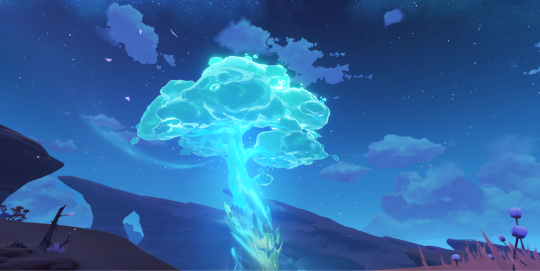
“But the reason it is effective is due to the nature of the origin, the primordial... based on the records, the constituent elements should be a "Circle of Four Orthants" and a "Tree of Emanation"... flows from the roots toward the center of the circle, and the circle encircles the abstract of... It's akin to pie crust and the filling of the pie, a metaphor sure to excite Jakob.” -Book of Revealing, Enigmatic Page VIII
And plant them we shall! That is just what Greater Lord Rukkhadevata and Raiden Ei did with Egeria and Raiden Makoto’s consciousness. Egeria’s consciousness sleeping in the Gaokerena has always reminded me of Avin’s Urstone, long before having the language of “will” to talk about it, but I could never quite explain why. I think the answer is a little more clear to me now, though there’s no concrete way to prove this theory at the moment. The Harvisptokhm, the Sacred Sakura, and I would also venture to guess the tree at Windrise are the result of planting either the source of consciousness or a fragment of consciousness, which anchors the consciousness to the mortal realm and allows it to exert its will on the land by purifying and containing its “filth.”
These trees all belong to the consciousness of gods and ascended allogenes, but Avin is as ordinary as they come, so how is it possible to suggest that her Urstone is anything like the Gaokerena or Makoto’s will? Maybe all that’s missing is “time”?
So…what is "it"?
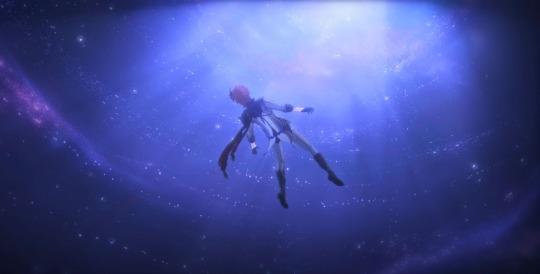
“An external form is but a gift of time. Through ‘growth’ comes change, and even abandonment of previous forms. However, our true nature is not so easily affected.” –”Where Lies the Path Home,” Sapientia Oromasdis: Act II
Now with all of that set-up out of the way, let’s get to the heart of the matter here…ignore the pun.
The Archon Quest establishes early on that Childe’s Vision’s malfunctioning and his bad mood are connected to one another, and with Act III and IV we see that Childe is literally being summoned by the whale – it is calling out to him, drawing him into a rift where it swims in the Primordial Sea. His Vision’s malfunctioning is what I want to zero in on first to begin to answer the larger question of what the whale is and explain Childe’s movements so far.
Once again, Aranyaka becomes very relevant here. When the Traveler saves Rana at the end of the quest after resealing Marana’s Avatar, Rana resolves to go out on an adventure and receives a Vision of her own. Though we are not shown a visual of this, it is described on a black screen of white text:
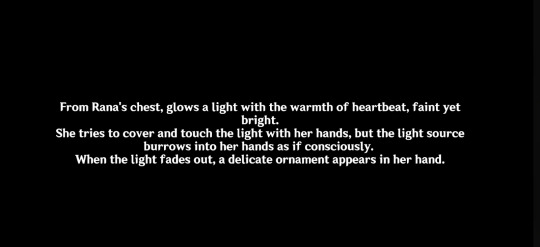
Rana pulling the Vision from “a light with the warmth of a heartbeat” from her chest is imagery we’ve already seen before, when Avin pulled the lens from her chest in the collective dream. I mean, isn’t the parallel a little too on the nose here? Avin created a lens, something you use to see and perceive, and Rana was granted her…Vision? …Why are you booing?
Although Rana’s is the only Vision story so far that fits this imagery like a glove, I think Act III and Act IV offer some more support for where I’m going with this. Despite having Childe’s Vision in their possession since Act I, the Vision is shown twirling at the beginning of every dream sequence the Traveler experiences in the Fortress of Meropide, sequences that seem to be copies of Childe’s memories while he was a prisoner. The fact that the Vision doesn’t need to be on the physical person of its wielder in order to transmit these memories could be an indication of a deeper connection between the Vision and the wielder – that is, the Vision is similarly a physical extension of its wielder’s “Will,” created by their Urstone or “Heart,” and therefore is a part of them, like the fruit of a tree. And if that’s true, then Venti wasn’t kidding when he compared Visions to organs.
This also puts the Vision’s malfunctioning into a different perspective. To go back to Nietzsche’s statement about Will to Power, will can only operate on will, and will is the causality of all things – through this lens, it may be correct to say that the traces of “it” that Skirk could sense on Childe are traces of the Abyssal whale’s will, and that its will is interfering with Childe’s own will at this fateful moment.
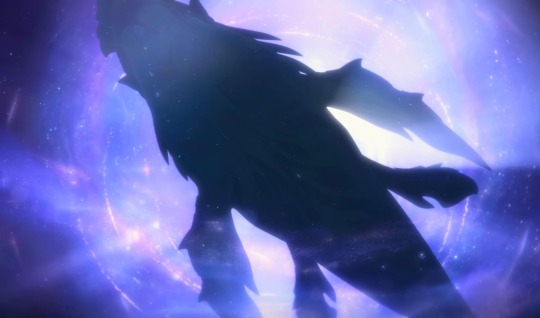
If we buy the idea that will is at least part of what can change your fate, and that Childe has traces of the whale’s will left on him, then the secret of why “it” has reappeared now may have been foreshadowed by what Nahida said in Yoimiya’s second story quest: that “meteor showers'' appear as a result of many intricate fates interfering with one another.
Specifically, it’s an allegory for Childe and the whale. The dream Childe had when he fell into the Abyss and the meteor shower are analogous, to be sure, but let’s not forget about our good friend Mr. Freud here either, who’s analysis shows us that dreams are suppressed wishes translated into images. From that perspective, it would also be correct to say that the meteor shower is analogous to a wish. That is, Childe’s fate and the whale’s fate are interfering with one another because of their encounter in the Abyss when he was a young teenager, and perhaps the Abyss appeared that day because Childe’s fate and the whale’s fate were interfering with each other then too - and that this was Childe’s wish all along:
“Pursued by bears and wolf packs, he lost his footing and fell into a bottomless crack in the earth's surface.
There, he witnessed the endless possibilities of another ancient world. There, he would meet a mysterious swordswoman...
Or perhaps one should say that this dark realm had sensed the burning ambition in this boy's heart.” –Tartaglia, Character Story 4
As for the larger question of what the whale is, it’s likely not very different from Visions, or the blades of the Raiden Gokaden, or Avin and the lens. It is an extension of the Abyss’s will that branched off from its source a long time ago, a primordial being much lower on the Abyssal phylogenetic tree than the more humanoid Abyss Heralds or mages. That’s as far as I feel comfortable speculating about its origins for now, but I hope we get some clarity on its age and “distance” from its source very soon. Speaking of which…we haven’t talked about Caribert yet, have we?

There’s something eerily similar about the way that Avin described her world as a “tiny space” before changing her fate when we consider the additional context of Caribert. When he regained consciousness, he said it felt like he had just woken up from a “long dream,” and that in his dream he was hiding in a “little room,” and that he had no desire to leave it. I think this language is similar on purpose, and it tells us some more crucial information about Urstones, will, and their relationship to these curses placed on the Khaenri’ahns.
The “little room” and the “tiny space” are metaphors for a person’s perspective, which has been repeated over and over again in nearly every Fontaine world quest thus far to further our understanding of aesthetics. It’s clear from those quests that an individual’s perspective is limited, but it can be broadened by interacting with others + the passage of time, and that over long periods of time these perspectives allow for aesthetic values to change. Thus, the world is also changed. But the opposite of change is stagnation, and stagnation is precisely the result of losing the ability to connect with others - indeed, the will to leave the tiny room.
We’ve already established that when “will” exerts its influence on another will, it can change the “shape” of the will it is dominating - the Frostbearing Tree is a great example of this. The Hilichurls have also had their external forms altered, and they erode away until eventually dissolving into the mud in the Chasm. So maybe, just maybe, the “curse of the wilderness” is a result of their will being tampered with by the same “thing,” such that their inner world becomes so small that they cannot find their will anymore, and therefore they cannot change their fate.
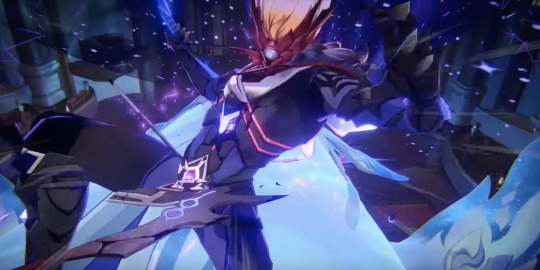
Childe is briefly seen fighting the whale in his Foul Legacy form in the version 4.2 trailer
Now, I’m not suggesting that the traces of the whale’s will would ever result in Childe becoming a Hilichurl, or that the whale is responsible for the curse of the wilderness at all. What I am wondering is if this is why Skirk took Childe up as her disciple – to teach him a “form” of combat that would maintain his grip on his will, on some kind of “belief,” not allowing it to be dominated by the whale’s will, so that there is yet hope that Childe can change his fate.
And if that is true, then here is my last theory before I disappear: Yoimiya’s belief that a child’s wish is precious and worth protecting is likely an allegory for Skirk’s motivation to train Ajax, and the relationship between Yoimiya and Avin is also meant to foreshadow them – a master and her disciple, a traveler from afar and a child of this world, a child-at-heart and a child who is lost. This core belief is what makes Yoimiya’s heart pure, and by passing that belief on to Avin, she plants the seeds of new hope for her to defy fate, and one day she may do the same for someone else. This, in essence, is the meaning of will, and that is what I believe Skirk’s lessons were meant to teach Ajax. And that is a twist that I truly never saw coming.
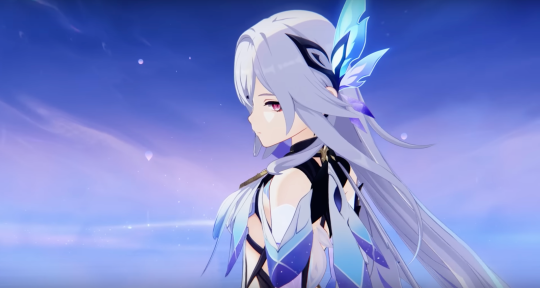
TL;DR: The Urstone is the source of will that exists in each person, will is what translates thoughts into images and objects, smaller "wills" or "ideas" split off from the Urstone/heart/source/consciousness and allow for will to spread and exert its influence on other wills, and Skirk may have more in common with Yoimiya than you thought.
Thank you so much for reading, I really hope it made some sense. I would love to hear what you think of all the lore up to this point and what you make of it! :)
Sources
Yoimiya Story Quest Act 2 (Full Quest) Carassius Auratus Chpater: Act II | Genshin Impact - YouTube- grabbed the “is this…the power of my heart?” screenshot from here because I forgot to take it in my alt’s playthrough.
Nahida Story Quest 2 - Using the fire seed to save Grounded Geoshroom | Genshin Impact 3.6 - YouTube - Video still of Lumine holding the fire seed from this video.
Beyond Good and Evil by Friedrich Nietzsche, which you can read for free here. Page numbers are given from my hard copy.
A General Introduction to Psychoanalysis by Sigmund Freud, also can be read for free here.
For more analysis of the Will to Power doctrine, check out Stanford Encyclopedia of Philosophy.
#genshin impact#genshin lore#genshin theory#genshin meta#genshin impact lore#genshin impact theory#fontaine#tartaglia#childe genshin#skirk#yoimiya#theory
73 notes
·
View notes
Text

It's officially New Year's here now that it's midnight and I feel like it's a good moment to express my humble gratitude for each and every one of you. Know that I'm really lucky that you have interest in my portrayal of Dain, regardless of the creative liberties I take for him given the little he has exclusively about himself. Sometimes it can be hard and not without its ups and lows, as he is a unique character that is hard at times to find reasonable and plausible ways to weave interactions, even more so when the content related to him is given with microscopic spoons once per year (with the miraculous exception of last year where he made a meaningful cameo in Khvarena of Good and Evil). Being up to date with the lore as someone who has access to a vast sea of knowledge as Dain isn't without its challenges too, no matter if I'm a lore lover, as the lore in Genshin is still growing and it's hard to remember everything it is to remember.
So to all of you that decide to stay and give me and my Dain and chance despite its difficulties, thank you. I am looking forward to see what we can build together through IC interactions and I hope that what concerns the community, it will become a brighter place to be in and to enjoy this ongoing ride together.

#◟༺✦༻◞ what lays behind the mantle of faux stars ┊ooc.┊#honestly I'm bad at these#and I also feel extremely shy for some reason#but a small gratitude is in order#for all of you lovely peeps who are here ;;#for those of you who are still waiting for midnight to come#Happy New Year from the future!#I'll never get tired of that joke djfhjg#thank you again ♥︎
8 notes
·
View notes
Text

𝐂𝐋𝐈𝐈. I'm sitting here thinking about Khaenri'ah things™ and how multidisciplinary that kingdom was for millennia, touching on expertises such us:
✦ Academics concerning both Teyvat and what they must've discovered in their pursuit of the Abyss all the way down below the bowels of the world, going as far as touching onto knowledge concerning the Archons, which was branded as "forbidden". Highly likely to think that the Universitas Magistrorum is comparable to the Akademeia in terms of knowledge it manages.
✧ Military. Segregated outside Khaenri'ah partly as spies (as seen as least in Sumeru, who knows if in other nations too) and inside the kingdom by differing them from those who take care of royal matters and those who do the rest.
✦ Creation of automatons. While still part of the military, this deserves its own field given the vast options of machines they have created, some of which I wager help do mundane things within the kingdom.
✧ Alchemy —Khemia—. This is a huge field in and of itself, granted that it's what allowed them to reproduce life that would later on become a source of nourishment for the population, granted that where they live and highly likely by proximity to the Abyss, no natural life (flora or fauna except for Inteyvats) grew by itself. Includes ambitious projects such as the one Albedo describes of human creation as the peak of the opus magnum of Khemia.
✦ Abyss. I'd dare to say that this became a religion in itself, ironic that many of the Khaenri'ahns went from repudiating gods to worshipping something else in their stead. But that aside, while I have no doubt that those who were filled with obsessions might master any of the aforementioned fields and be part of this, I am going to include those into esoteric arts that were already able to summon rifthounds as teased in Khvarena of Good and Evil. I would say that these are a group of people, quite numerous, but which kept things under wraps and that the society was divided between those who had nothing to do with the Abyss dealings and those who did.

#◟༺✦༻◞ events to be remembered in blue veins ┊addendum.┊#I'm currently nomming on my dinner#but soon I'll be here to do things#answer DMs etc!#I had this in my mind since I began#to say that I would like to talk more about Khaenri'ah#so I had to get it off my mind via something#in this case an addendum post djfhjg
2 notes
·
View notes
Text

I never made an official announcement, but I think that this is a good moment to say that I'll be on semi-hiatus. Things in Genshin will continue to be calm until Fontaine most likely, I have three weeks until the final wave of finals before summer vacations and on late June FFXVI will be released. This is not to say that my activity will be none, I do want to get some posts written that I haven't about Dain and what was seen in the questline of Khvarena of Good and Evil. This is more meant towards IC activity as otherwise I'll be lurking mostly given that energy is low due to the few partials that are left to do.
#◟༺✦༻◞ what lays behind the mantle of faux stars ┊ooc.┊#most of the people have also moved to HSR#from what I observed#so my dash has been relatively silent#and easy to catch up with#which is surprisingly nice to me#I hope that you peeps take care
4 notes
·
View notes
Text

𝐂𝐗𝐕𝐈𝐋. Following the series I started of rewatching the AQs Dain participates in, this will be the second part of AQ: We Will Be Reunited. If you want to check the first part, it is here!
✦ ◜...Engulf the faith of the enemy in flame, and bring glory to Her Highness, the Princess... 'Loom of Fate', initial operation.◞
One of the good things that brings revisiting cutscenes is finding about the existence of things that I swear it feels like I slept on. While the Loom of Fate operation is something that was brought up even during Caribert's AQ, the first part was completely blank to me. It's highly curious that the target of these flames discussed about in the talisman an Abyss Mage carries is highly likely to be the gods themselves, as they are the source of faith people have, which also means that the people who live under the Seven may as well be the ones considered enemies in this text here. It is in tune with some descriptions about Abyss Order members not tolerating these people's ignorance but also that the Abyss Order doesn't care if they plunge the entire world in darkness— which King Irmin himself seems to have desired too.
✧ ◜Only the Abyss Order has consistently sought out the remnants of Khaenri'ah. Despite being far from human, they seek out this lost human civilization quite persistently.◞
It would be interesting to complete this quote with something like [because the Abyss Order is composed of people of Khaenri'ah], but if we look into the Khvarena of Good and Evil as well as Caribert, we can tell that the Abyss Order isn't formed in its entirety of Khaenri'ahns, but of others as well. Either Abyssal creatures that already existed before the Abyss Order's foundation, or people who joined after that were looking into Khaenri'ahn things left behind as it happens in Khvarena of Good and Evil, or even the Narzissenkreuz Ordo (although it still remains to be seen if the Abyss Order has creatures like the Iniquitous Baptist, the maximum we've seen is Abyss Heralds / Lectors and Black Knight Serpents if you consider those as part of them too, although not all of them would be and we know of Jakob that, as a Neohuman he was an Iniquitous Baptist). One way or another, we always encounter people who are interested in what Khaenri'ah leaves behind and turning into Abyssal monsters or being up to no good.
✦ One of the consequences of having good builds and being at a high level brings is that this can make strong enemies feel like they're nothing (at least, this is a personal observation of mine) such as the Ruin Guards. But it's always intriguing to see someone as strong as Boreas, who used to be a god before he decided to submit to the Seven and let another do the job of an Archon as he saw himself unfit to dwell among humans like it would be expected of one, describe the first Ruin Guard in such a way that he claims that it's stronger than many allogenes too. Perhaps one of the reasons of this is that, as the first one, it was wilder than the rest which might've been more controlled.
✧ ◜You are as vexatious as ever, Dainsleif, enemy of the Abyss! I sense your soul is stained with terrible bloodshed, perhaps from your darkest nightmares. Unless... Oh, and something far more dangerous! You reek of a corruption familiar to me... Then we are the same. We're both dangerous. But dangerous from outside the Abyss Order must be caught and caged... ◞
Another thing worth commenting is that the Abyss Herald has been pursuing says that he's an enemy of the Abyss, not the Abyss Order alone. It does bring the question if him opposing it openly and also being unable to be defeated by any Abyss Order members makes him a genuine enemy to the entire concept, the entity built around the Abyss in Teyvat or the Abyss Twin as in Caribert Chlothar says that in Khaenri'ah it was believed that they are the Abyss due to their procedence. Also, I can't help but find amusing that around 400 years of being pursued by him and most likely know him (I don't doubt that they must've taken intel from the Abyss Twin also) only now it is when they realize that he's corrupted even though... he technically was pretty early on during the Cataclysm. Either Dain concealed this well, there is something else that kind of acts as a veil to hide this or this corruption has been mutating within him for over centuries, which can also be a possibility.
As one last point worth mentioning, I suspect that any other individual that can wield the power of the Abyss and is outside the Abyss Order sphere is considered a danger to them, too. Individuals such as Jakob, René or even Skirk and potentially Surtalogi could enter the equation as they can do it too. Now, however different it may be from what the Abyss Order uses as the power of the Abyss might have its own variations too just as the 7 elements have is a topic of discussion for another day.
✦ ◜That man, Dainsleif, was the "Twilight Sword", one of the royal guards of the final dynasty of Khaenri'ah. 500 years ago, he failed to prevent the destruction of Khaenri'ah. A curse of immortality was laid upon him, to forever wander the wilderness... while he watched the people he was supposed to protect turn into monsters of the Abyss.◞
And lastly, for some reason, these words hit different after seeing the Caribert AQ. Mainly because we know that two curses were laid on the people of Khaenri'ah depending on the purity of their blood: immortality to those of pure blood and to turn into hilichurls those who aren't pure-blooded. But there is nothing about these cursed people turning into monsters of the Abyss and with quests that come after We Will Be Reunited it's implied that there are those who turn into Abyss monsters willingly. I don't know if the venom the Abyss Twin has here while talking about Dain is because of this or something else, but at any rate and considering what we learn in Caribert... I can't help but find it hypocritical.

#◟༺✦༻◞ Events to be remembered in blue veins ┊Addendum.┊#speaking of the BKS#I should revisit the dialogues of a few of them too#as they said pretty interesting things tbh#I'm once again salty about the last point#specially thinking about C.ollei's miscellany#and then Caribert's AQ#but I'll leave it at that#with this comes the closure of this AQ#the next will be Requiem of the Echoing Depths
1 note
·
View note
Text

Today I've been playing the Khvarena of Good and Evil quest and... I have so many thoughts that I would love to talk about. Right now my mind is everywhere on a million things as it always is whenever I finish a huge quest like this, but I'll be leaving some brief thoughts under cut:
Each day I see one of these quests that disclose so many dark prospects of this game I'm more excited about it, honestly. I still have to gather my thoughts, but my monkey brain can't help but think about Dain. About how he, alongside the sussy one-armed sage, Schwanenritter and Pari fought together against the abyss and how Dain, the sage and the first Pari did this huge thing together to purify and cleanse the place from the abyssal influence with what's called "a vein of the ancient tree" which I presume to be Irminsul.
The fact that the first Pari still remembers Dain warms my heart, as well as I feel a bit bad for Zurvan (that's the Pari's name) because Dain said that he would come back or that they'd see each other again and she felt kind of... bitter maybe? About it. First it was Halfdan, and now it's a tiny little Pari that look at Dain the way they do and I'm just emotion™ at all of this.
#◟༺✦༻◞ what lays behind the mantle of faux stars ┊ooc.┊#please don't mind me#just me crying over this man#tomorrow I think I'll be posting#one of those index posts#about the things I want to talk about more seriously#before jumping into Nahida's quest#as I know it's packed with goodness also#some of which I've read#but it's better to play the thing yourself#instead of reading an incomplete script#released a couple of days before the patch's drop#let it be known that my muse for Dain skyrocketed with this#and I plan to write little somethings tied to him also#because this quest helped me solidify some thoughts#I had before#and I'm enjoying this so much ngl#anyway! eventually I didn't really do anything#for the second anniversary of me writing Dain but#it's okay#this was a good day spent djfhjg
3 notes
·
View notes
Text

𝐂𝐗𝐕𝐈. Pneumousia annihilation and presence of these elements in other parts of Teyvat outside of Fontaine.
I have yet to finish watching the Fontaine livestream, but there is something that attracted my attention worth mentioning, as I’ve been talking about these two “semi-elements” in the past. It’s interesting to say the least that the new mechanic that encompasses both ousía and pneuma are under the name or arkhe, which I presume to come from αρχή which primarily means origin, beginning.
It’s also interesting the though, if they eventually expand more on these elements (I’m sure they will, they’ve been teasing it ever since 1.4, following Enkanomiya and then relevant lore in the quest line Khvarena of Good and Evil specifically, but also in Requiem of the Echoing Depths when Dain said that in the Chasm there is more than one strange power, which makes seeing souls not so strange), the concept that these two elements that represent chaos and order among many other things like darkness and light thematics would be the origin.
#◟༺✦༻◞ events to be remembered in blue veins ┊addendum.┊#furthermore that Greek word#can also mean sovereignty or authority#I’m looking respectfully HYV#you better expand in this more 👀#I’ll edit this post later#as I’m currently mobile bound
1 note
·
View note
Note
Do you think Halfdan is a exacly a pure blooded Khaenri'ahn in the same way Chlothar Alberich is? i asked this question to others some said yes, some said no, what do you think about this?
The caribert quest really made me confused about this..? if non- pure blooded Khaenri'ahns turned into monsters then the black serpent knights isn't pure blooded then..? Yet we have Dainsleif in world quest described as half-turned monster but he isn't like Halfdan in any way. And there's this ring of nibelung which Dain used where he refers this by "how he retrained his consciuosness without it" to Halfdan, also there's ynghildr who used the same ring but turned into a monster anyway.
i personally think it makes sense to Halfdan to be impure blooded Khaenri'ahn because his name "Halfdan" means half-danish also in epic poem Beowulf the name Halfdan is solely named after a Man just because the admixture of in his blood.
So what do you think? Love to hear your thoughts
Hello, nonnie! First of all, thank you for your appreciation for my thoughts and for the question, I hope it won't be too confusing what I'm about to ramble.
To be direct, yes. I believe that Halfdan is a pure-blood Khaenri'ahn. Not solely because of the star-shaped pupils he has like Chlothar and Dain have, but because he also didn't turn into a hilichurl. Now, let me preface that I see perfectly where you're coming at the mention that he turned into a monster either way, but it's highly relevant to give importance to the word choice you had yourself: monster, not hilichurl. The reason I say this is because I have my suspicions that the curse of wilderness, the turning into an abyss monster (see as abyss monster: mages, lectors, heralds, iniquitous baptists) and the turning into what we typically know as Black Serpent Knights fiends have a root in common which is this demonification (there was a time when the description of Nahida's twig talked about a demonic sky), abyss-like influence with or without Forbidden Knowledge in between.
So to make better sense of why I separate these three despite all of the groups being essentially monsters, I'll make a little break down:
In order to become a hilichurl there are two requisites: 1) is to abandon one's god either directly (x) or indirectly (x's descendants) and 2) you can't have the purity of blood part of the Khaenri'ahns are known to have (I don't know if it has anything to do with the fact that they're untainted by fate, but I'll leave this as a bit of food for thought). Halfdan in this case specifically would be ruled out of this because even if there were this doubt of whether that clean star-shaped pupil is a 100% trustworthy sign of one's purity, he didn't turn into a hilichurl despite being far from Khaenri'ah territory.
Now that we have that out of the way, let's focus on the other two different kinds of monsters. Those that are typically connected to the Abyss Order (mages, heralds, lectors, baptists), in order to turn the way they currently are, there seems to be an undefined pre-requisite. The one that I noticed is the will to become one such monster, to embrace the abyss willingly. It may not be accurate to the way it happens, but we do have a couple of examples where the common denominator of these individuals is that they wanted it. These individuals are: Klingsor (he appeared in Khvarena of Good and Evil), Jakob and René. Klingsor took great interest in the abyss and talked about the unfairness of how the Dahri were treated despite their efforts to help in Sumeru (if I'm not mistaken) and he's also a descendant of Hadura, a Khaenri'ahn Schwanenritter. If we follow the same principle as before, it is safe to assume that Hadura was a pure-blood as otherwise he would've turned into a hilichurl as soon as he left Khaenri'ah and the curse of wilderness would've affected Klingsor too. Jakob and René sought a manner of transcendance in order to survive the coming calamity René foresaw judging by the documents left in Sumeru and then Jakob's appearance as an Iniquitous Baptist, thus it wouldn't be far-fetched to think that it was the same for René before he turned into Narzissenkreuz. Lastly, if my hypothesis that willingness to embrace the abyss stands true, it'd fall right in place for other Khaenri'ahn survivors that were pure-blood to become this kind of monsters, as various texts and Chlothar's description of the Khaenri'ahn society depict a certain fanaticism towards the abyss. Nevertheless, it is also important to say that there is no need to be a Khaenri'ahn, a pure-blood one in order to become one of these monsters.
Then there is the fiends we know as the Black Serpent Knights. As I mentioned before, I firmly believe that the curse of wilderness is interwoven with the abyss someway, and so the same applies to me with the curse of immortality. By following the aforementioned theory, first they should be pure-blood Khaenri'ahns (unlike the other kind of monsters where this isn't a requisite, not even being a Khaenri'ahn to begin with, it's highly relevant here because these knights have an identity and they act upon what little remains of them of their identity, which is their duty as Black Serpent Knights or Schwanenritter) and second, there should be something else that isn't a willingness to embrace the abyss. From a myriad of examples, we know that even higher entities such as gods or dragons are susceptible to corruption (Orobashi for one if we think about the Tatarigami and the nasty voices one of the villagers hears, Dvalin, Boreas was an objective of the Abyss Order although he resisted), and as we saw previously, there are those who can become monsters (or perhaps transcendent ones). If we take Ynghildr as an example since you mentioned her, what we know of her is that she was a Schwanenritter who went to fight abyssal monsters and disappeared. But we know that she returned to her post within one of the golems as a monster version of the Black Serpent Knights we know. We also know of Dain (I'll get deeper into him briefly), whose body was half corrupted during the Cataclysm and that he, too, was fighting the abyssal monsters that attacked Sumeru. The one thing both of them have in common here is the exposure to the abyss, or perhaps to corruption. From Dvalin's case, we know that it suffices to have negative feelings and allow them to magnify in order to fall to corruption. If we're to talk about Halfdan directly, we have one thing that is clearer than others which is the fact that he was exposed to the defilement from the Chasm; another reason that can add to his corruption is that he had those negative feelings of himself for failing the people of Khaenri'ah and Dain for being unable to protect them, which could've festered further and possibly added to the corruption. We also have erosion (which personally, I think it's another manner of corruption or that, as the aforementioned curses, they're interwoven with this defilement) that may have added to him eventually lose a great part of his sense of self, self-awareness and turn into a monster. As Dain mentions of him, despite being a monster he's a special case because the level of self-awareness he had was considerably higher than the rest's.
To touch briefly onto Dain, and based on what I mentioned up until now, I think that he would sooner turn into a Black Serpent Knight-kind of monster than the former. He fought all these 500 years of being corrupted against it, which adds to my belief that there has to be a requirement of willingness in order to turn into the kind of monsters that are in the Abyss Order unless to some point he goes bananas and from an abyss-hater he turns into an abyss-lover. In regards of the ring, I can't tell how relevant or irrelevant it is. I'm aware of the theories about that being the ring of Nibelung, that it may have to do with the fact that he didn't get corrupted entirely (not without reason, as Ynghildr also had a signet and was lost— but I don't have enough evidence to think that a ring or set or rings ward the defilement from the wearer), but for now I'm keeping it shelved until we learn more about it. I also know that Dain says that Halfdan was able to retain some degree of self-awareness against all odds without some "it", but we also don't know if it's a ring or something entirely different.
So to summarize all of this testament: Yes, I believe that Halfdan is a pure-blood Khaenri'ahn even if he eventually turned into a monster. Nevertheless, this fate he met I think it's unrelated to the curse of immortality he has (unrelated as a direct thing, because indirectly he did turn into a monster because of it— if he didn't become "immortal", he wouldn't have lived long enough to become a monster and he clearly wasn't siding the Abyss Order, which may give us some insight of what his mentality was like in the peaceful days of Khaenri'ah: someone who didn't fall into the trend of abyss fanaticism many in the society seemed to have).
#anonymous#◟༺✦༻◞ what use has the veil of falsehood? ┊ask.┊#◟༺✦༻◞ what lays behind the mantle of faux stars ┊ooc.┊#thank you again for sending this!#and sorry for the long ramble#but I think it was necessary#in order to make myself understood better#please keep in mind that these are my own insights#and perception based on the same all of us saw in the game#but all in all Halfdan is an interesting character#that deserves his own merit#anyway! I hope all of this ramble makes sense
1 note
·
View note